
28 minute read
Hilltop Happenings
CLASS OF 2021 CONVOCATION
by John Downey, Senior Class Dean, Upper School and Middle School Latin Teacher
Dawned in their blue robes, poised and proceeding with distinction, members of the Class of 2021 formally approached the Convocation tent as if there had been no disruptions to their educational world.
Even though masked, the excitement and anticipation for the beginning of a hopeful and cumulative experience initiated by Convocation could be seen in the eyes of each senior. Also evident was leadership and resilience displayed and validated by the Berwick blue gowns donned by each member of the graduating class. Lem Randall, a member of the history faculty and head coach of Boys Varsity Hockey and golf, was chosen by the Class of 2021 to inspire and induct them into the Berwick Alumni Association.
“Embrace your role and have fun with it,” Mr. Randall encouraged the graduating class. “During the challenges that each of you will be facing this year, it would be very easy to make excuses or give reasons why this year was disappointing. But you have the opportunity every day to choose which ‘wolf to feed.’ Feeding the positive wolf will not only enrich your experience this year but also our community at large. Ultimately, you will leave a legacy to be remembered and be proud of throughout your lives.”

CLASS OF 2021 CONVOCATION
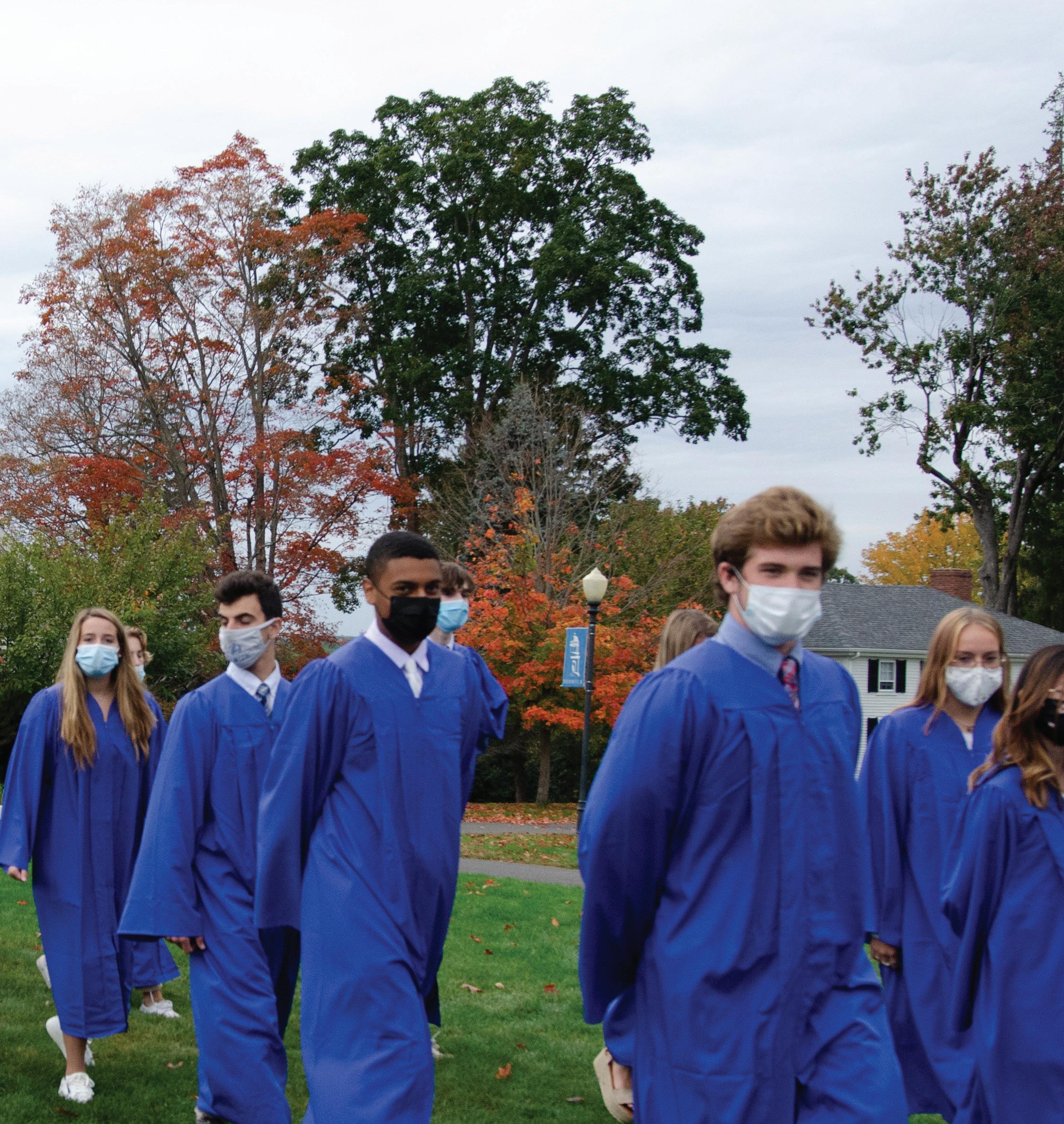
Unsung Hero
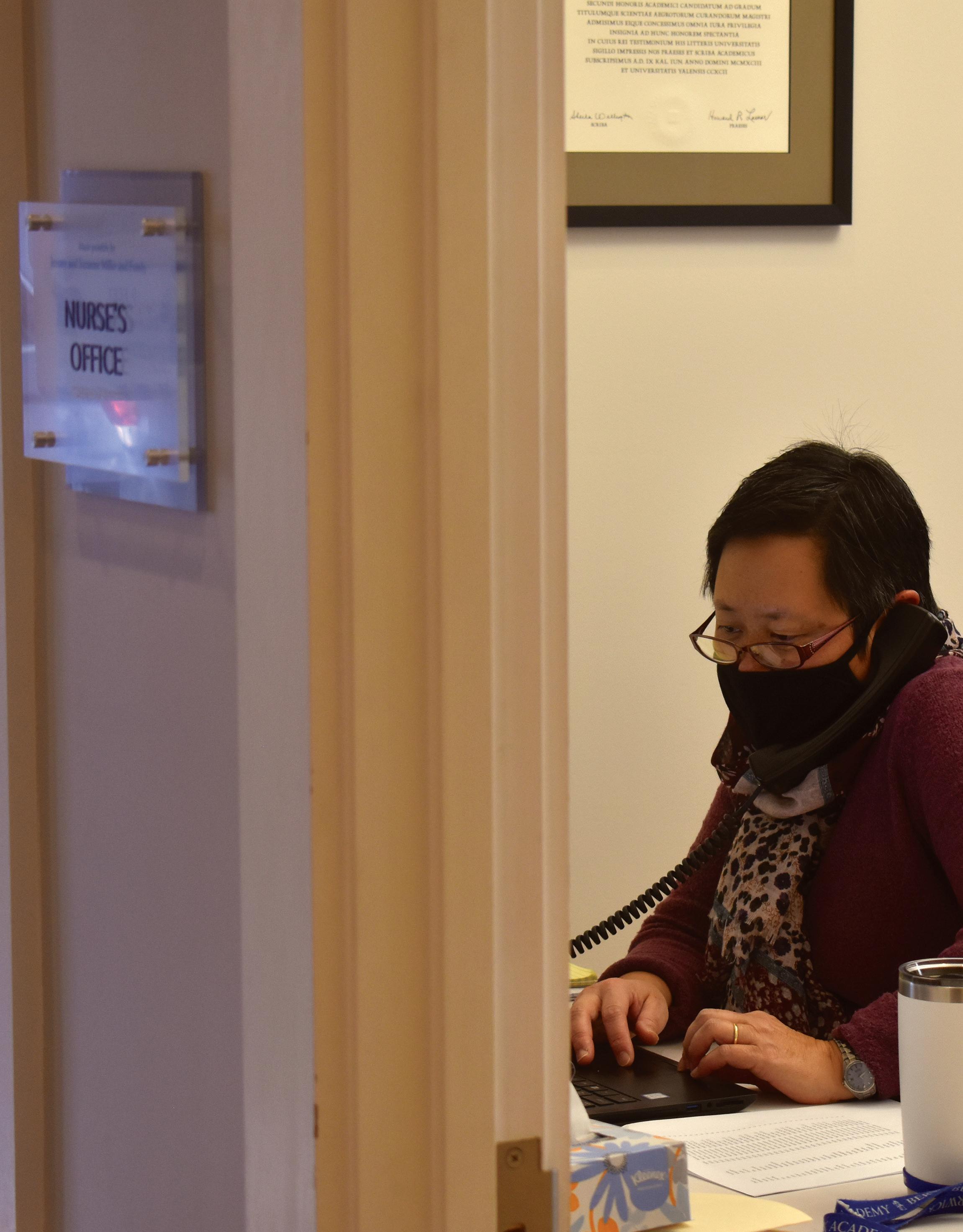
by Jana F. Brown
THOUGH SCHOOL NURSE KAREN CHIANG SAYS SHE IS JUST DOING HER JOB, SHE HAS BEEN INSTRUMENTAL IN KEEPING BERWICK WELL DURING THE PANDEMIC.
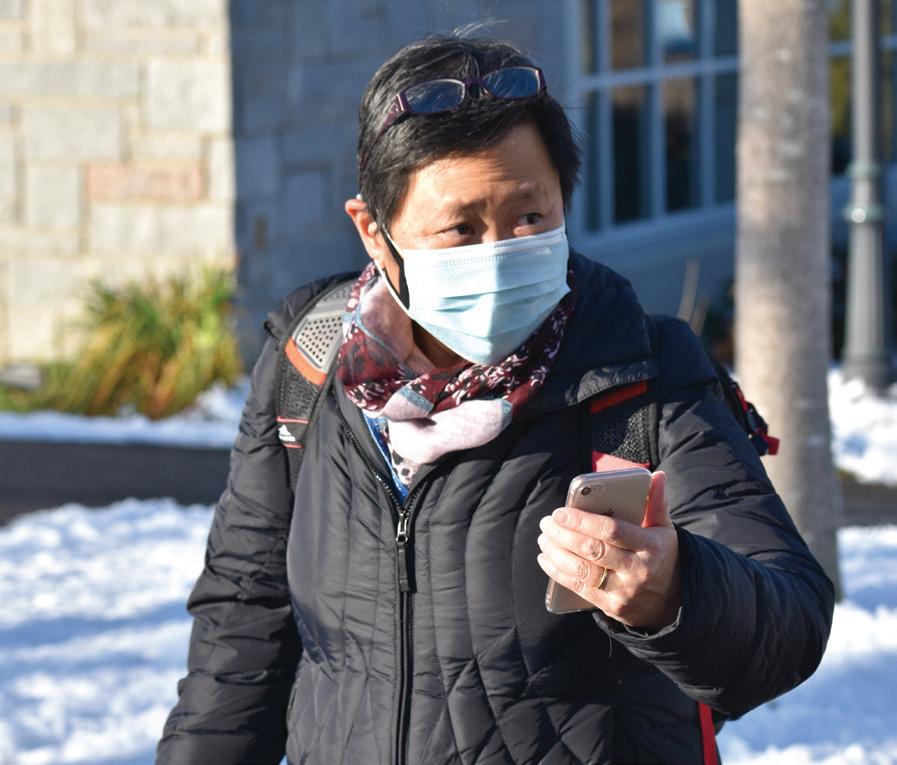
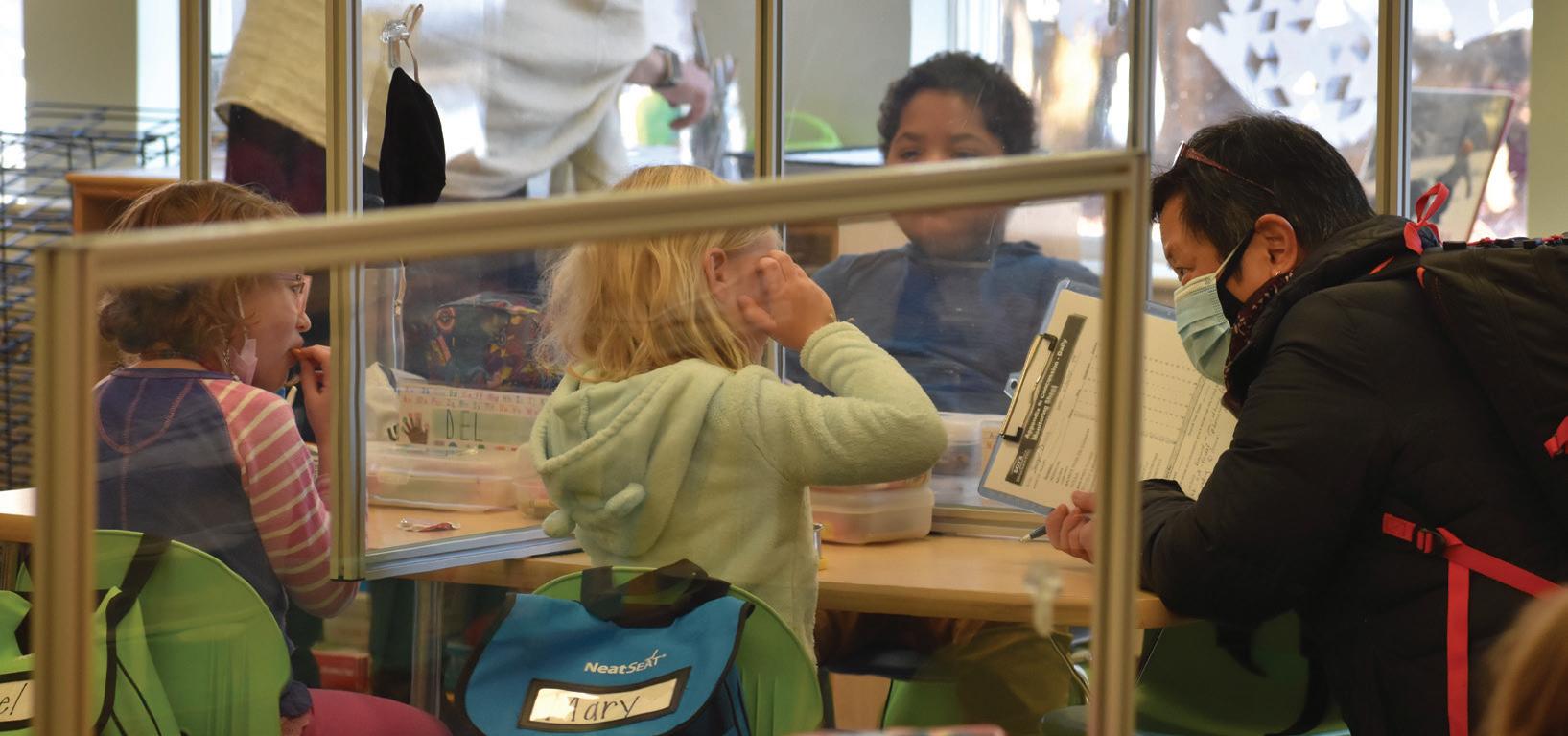
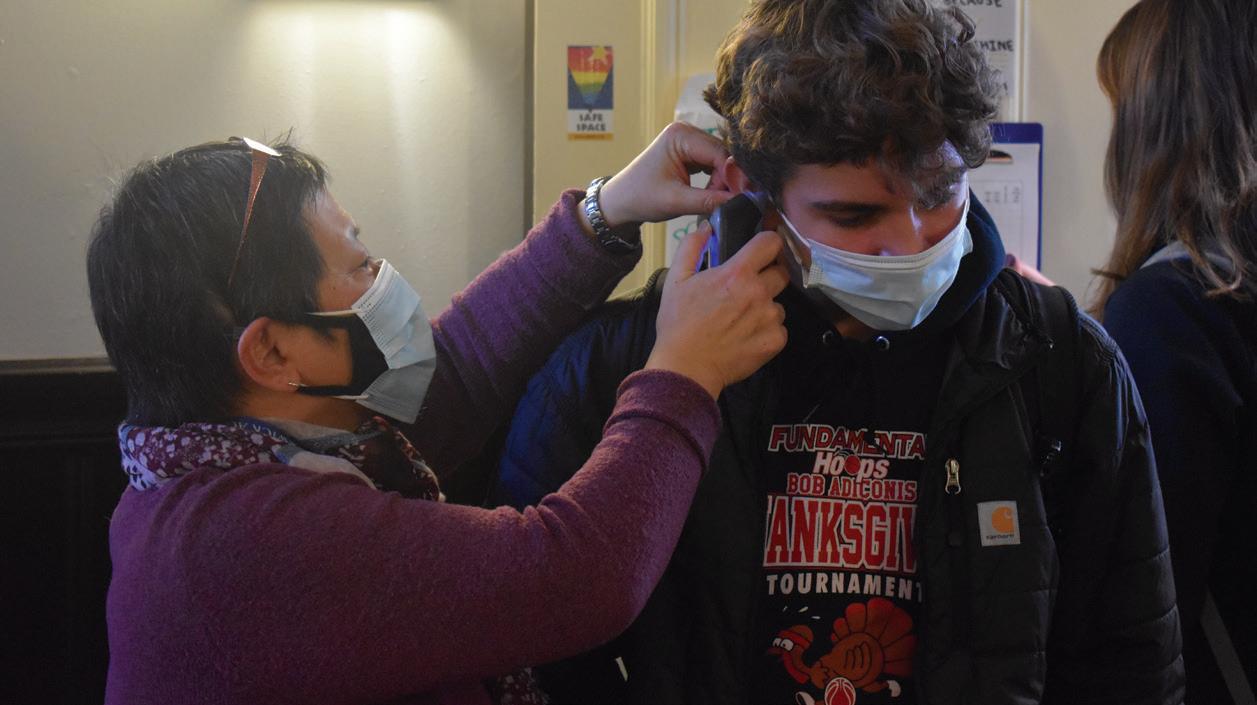
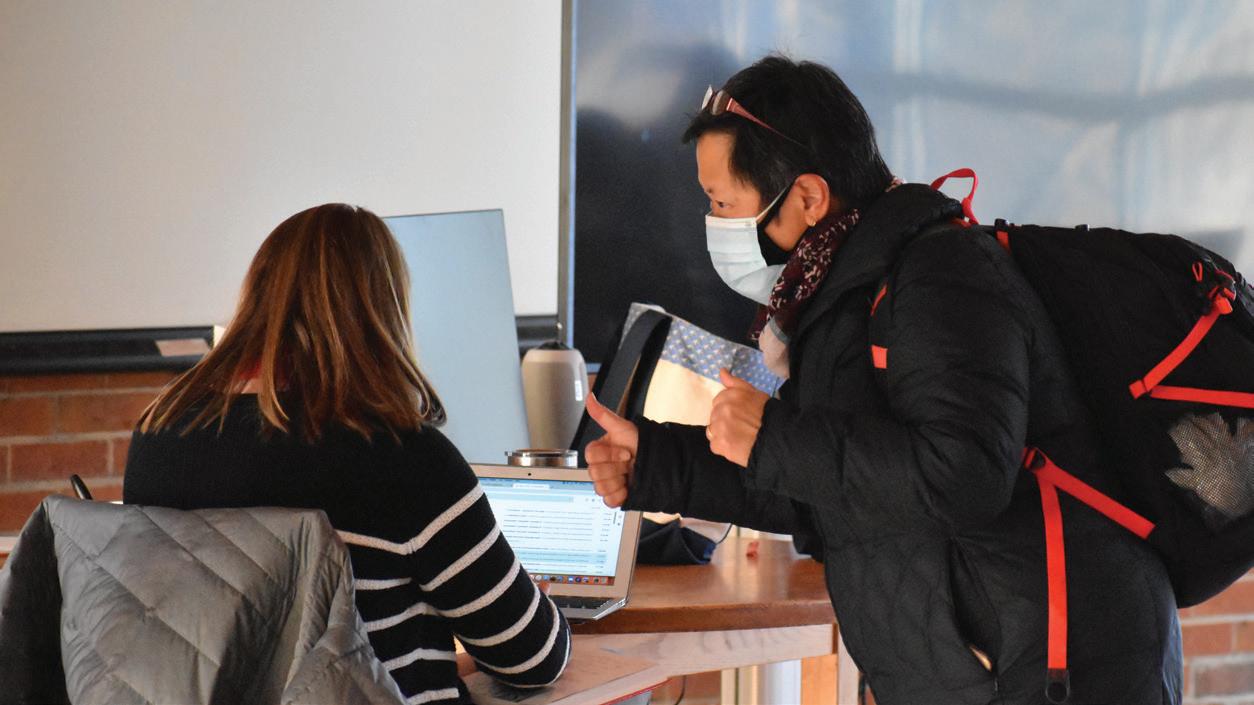
Prior to the emergence of the COVID-19 pandemic, Karen Chiang spent a typical day evaluating symptoms of students who came to her office presenting with coughs, headaches, and other common maladies.
“It was a responsive role,” says Chiang, who has been the school nurse at Berwick Academy for 10 years. “I had some regular visitors, but if a student wasn’t feeling well, they came to me.”
The good news is that, because of mask-wearing protocols and social distancing, the Berwick community has seen an overall reduction of common acute illnesses that circulate through schools.
If there is a silver lining to the COVID-19 crisis, it is an increased awareness of wellness at Berwick and other schools. Community members – students, faculty, staff – who once believed they should “push through” a day of feeling less than 100 percent are now not only asked to refrain from being on campus, but embracing the idea of self-care. Daily self-assessments help to ensure that anyone suspected of being COVID-positive will self-isolate, and also help remove those potentially sick with other illnesses from campus until they are well.
“I always knew that if we didn’t come in when sick and we washed our hands more frequently, we would have less acute illness,” says Chiang. “But I didn’t know we would have the opportunity to test that theory. I hope what might stick after this is that families and students won’t feel they have to soldier through. There is not really a policy change, but I hope the pressure we put on ourselves to keep going will decrease now that we know we do well with self-care.”
Chiang, with the help of part-time nurses Olivia Varano ’16 and School Health Assistant Margot Smith ’16, credits parents with being extra vigilant about their children’s health, and is grateful for Smith’s and Varano’s work to assist her with generating spreadsheets each morning to make sure all health assessments have been completed. Smith has learned about the team effort necessary to protect community wellness in a school environment. She praises everyone – from students to faculty and staff to administrators – for doing their part, but she gives particular kudos to Chiang for leading the wellness charge.
“Karen is doing an incredible job,” says Smith, who graduated from Sacred Heart University in 2020. “She has had to incorporate so many new tasks into her already busy schedule, and manages to get everything done in a timely manner. What impresses me the most about her is that she does all of this with a positive attitude.”
Varano speaks about Chiang’s tireless work ethic on behalf of the Berwick community, including serving as the resident expert on CDC guidelines, managing contact tracing and the logistics of daily health screenings, and communicating with concerned parents and faculty.
Chiang recognizes students for their diligence in wearing masks and washing their hands, faculty for their help in asking for compliance, and the facilities team for their work installing air purifiers around campus and plexiglass shields to separate students in their classrooms. What Chiang does not do is give herself credit for the extra work she has done to help maximize health and wellness on campus.
“Karen is definitely a hero to the Berwick community,” notes Smith, “whether she’d like to think so or not. We wouldn’t be on campus if it weren’t for her.”
Safety, Quality, Efficiency

by Jason Murray, Director of Facilities

Jon Douglas, Chief Financial Officer and Jason Murray, Director of Facilities
Safety, Quality, Efficiency. These three words continue to sit at the forefront of Berwick’s operations team, even in the midst of the pandemic.
Upon receiving word that the campus would be closed for the end of the 2019-20 school year, the operations team (along with the rest of the Berwick faculty and staff) went into full brainstorm mode. This, of course, was not only to plan for remote learning but to look at the physical plant and understand how we could safely accomplish opening campus for in-person instruction to begin the 2020-21 school year.
This was a Herculean undertaking, which required contributions from everybody. Every angle and decision involved extensive understanding and forethought. To continue to provide a safe return of the entire Berwick community, we needed to implement a to protect not only our members but also one that would culturally change the way we behaved inside and outside school. We began with fitting every classroom with high-efficiency HEPA air purifiers that can capture 99.97 percent of airborne particles with four air exchanges per hour and robust plexiglass physical distancing dividers on every academic surface of the campus across all three divisions. Digging deeper, these modifications had to last over time to provide protection
The Hilltopper and Hilltopper Junior Tents
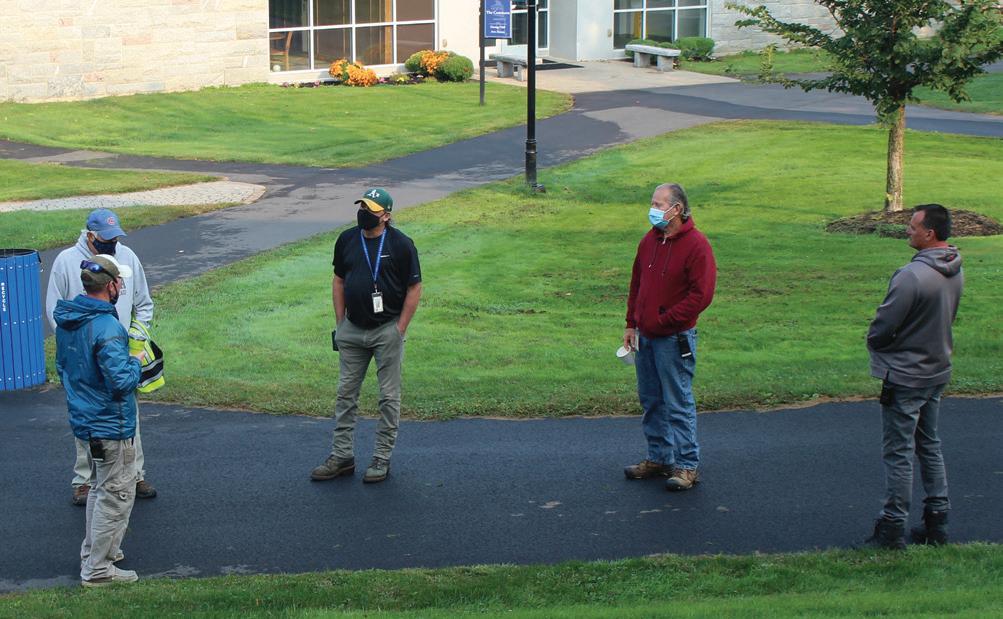
in colder months, when time indoors would be increased. We then added additional air-quality enhancements with larger airhandling systems that exchange our inside air with fresh and filtered outside air.
We have also incorporated one-way directional signage throughout campus buildings, with clearly marked entrances and exits, to avoid passing within six feet of one another. Without question, the addition of informative signage and sanitizing stations create a much cleaner environment for all.
Using our vast campus to learn while remaining appropriately distanced within Berwick’s beautiful grounds was another important change. We were able to accomplish this with a combined 40,000 square feet of tent coverage on the property. Pandemic preparations also impacted the way we prepare and consume food and dispose of food waste. This included purchasing 100 percent compostable utensils and individual serving containers and engaging student leaders in all divisions to embrace and promote the concept of a more sustainable and environmentally friendly campus.
The physical additions to the campus have been just as important as the education about the pandemic. The situational awareness across the Berwick community has helped us protect one another. Protocols and procedures established in response to the COVID-19 pandemic are likely to remain in place for the foreseeable future. Berwick is continuously striving to provide the optimal environment in which students can thrive.
Facilities team briefing
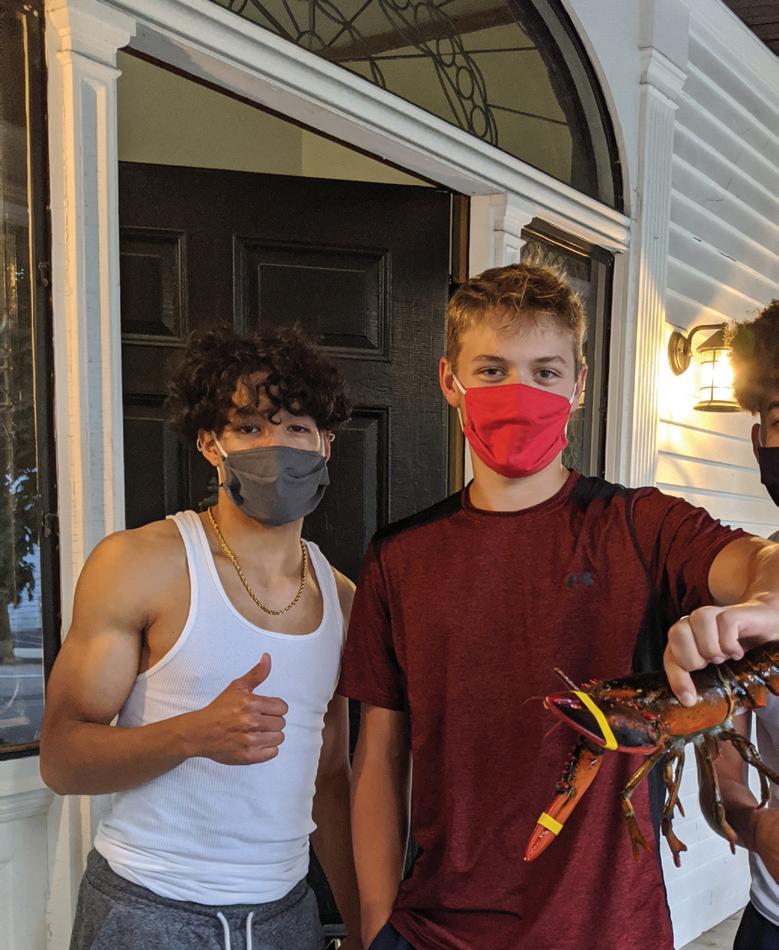
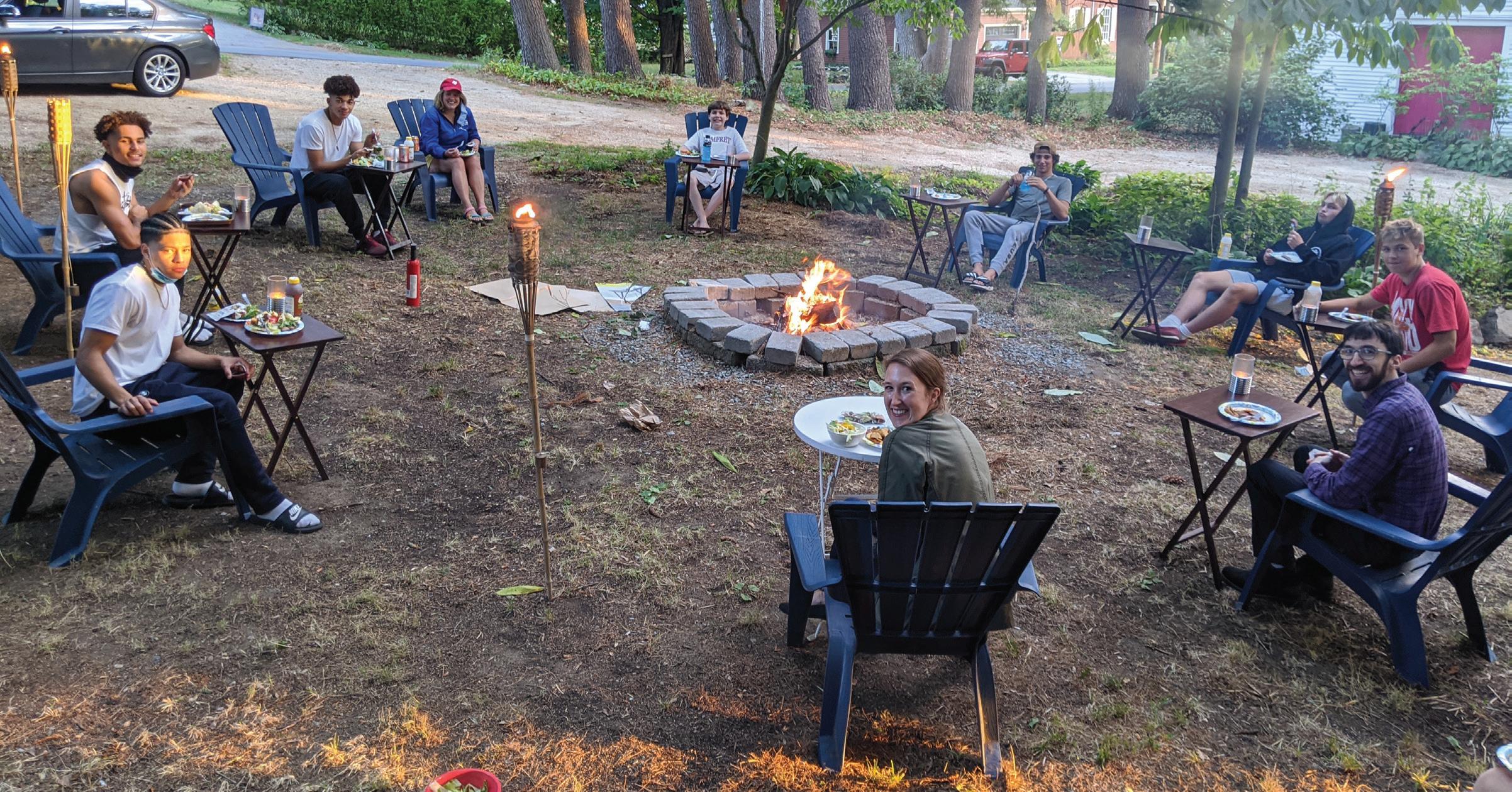
Lobster for special dinner treat Weeknight family dinners
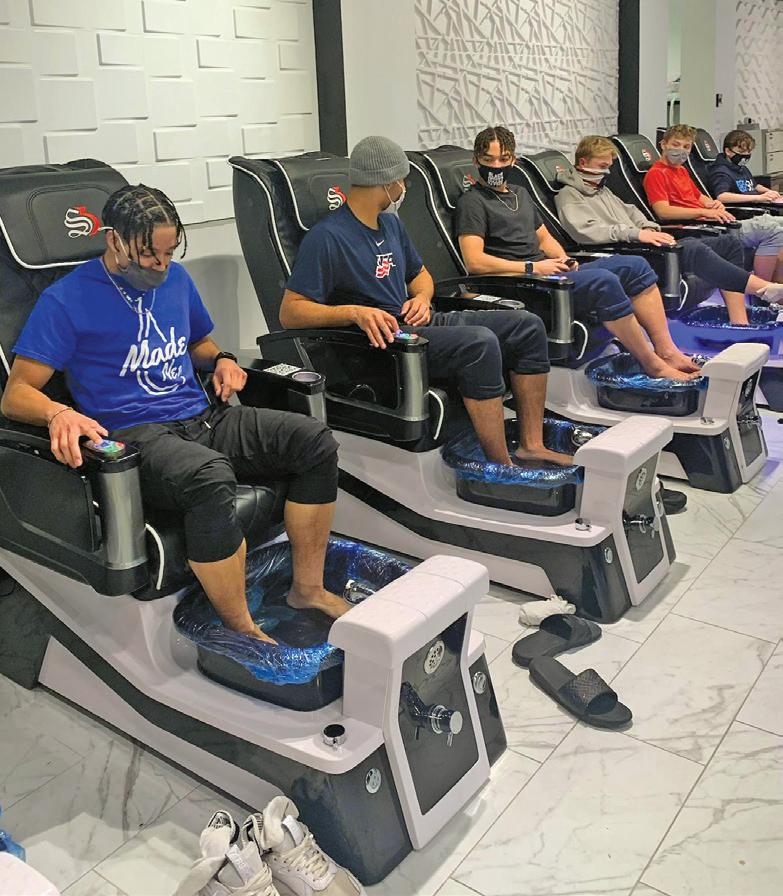
Hancock House
by Sarah Feldman, Middle and Lower School Counselor
The 2020-21 school year in Hancock House has been a different experience from previous years due to the COVID-19 pandemic, but Berwick has been able to creatively maintain many of the dorm’s routines, traditions, and experiences that make our boarding program special while keeping our students and staff safe.
One of the most essential routines to the staff and students in our house is family dinner. In years past, we ate dinner together every weeknight around our dining room table at 6 p.m., so we needed to think creatively to maintain this cherished routine. Through our community’s help, we transformed our backyard into an outdoor dining space around our firepit, which included individual tray tables, pre-portioned hot meals provided by SAGE, and lots of citronella tiki torches. When colder weather moved in, the wonderful grounds and maintenance crew installed plexiglass on our dining room table and placed an air purifier so that we could eat our meals indoors as a dorm family.
Our weekend activities kept us outside this fall with paintballing, batting cages, go-karting, and mini-golf. Our residential students have persevered through many challenges related to COVID-19 this year, and we are so grateful for their patience, humor, and, perhaps most of all, their dedication to each other.
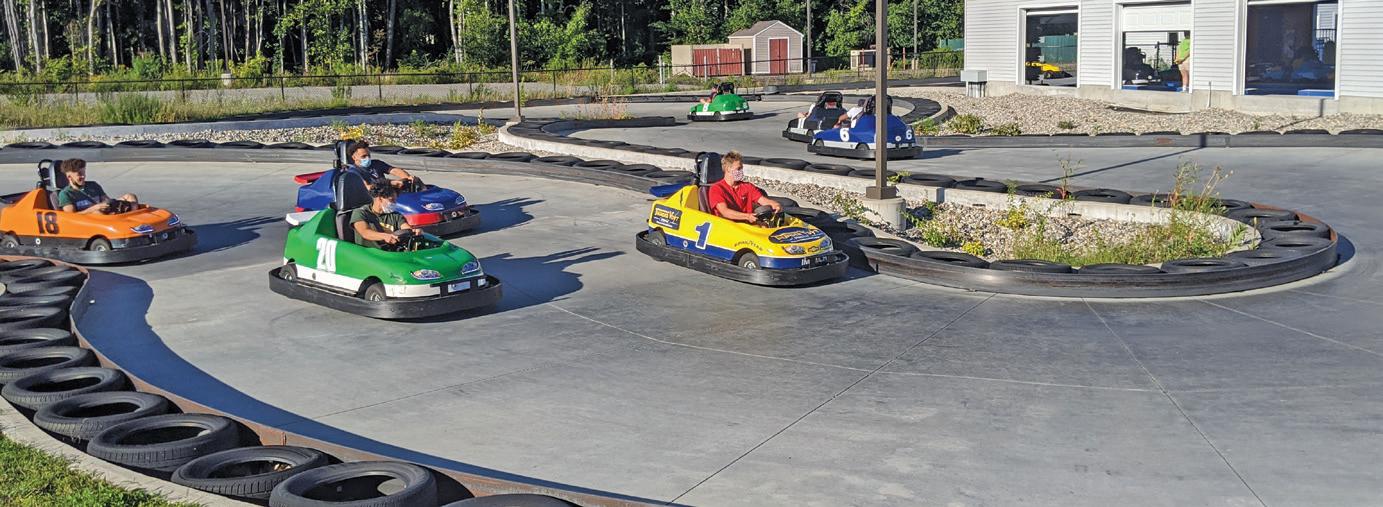
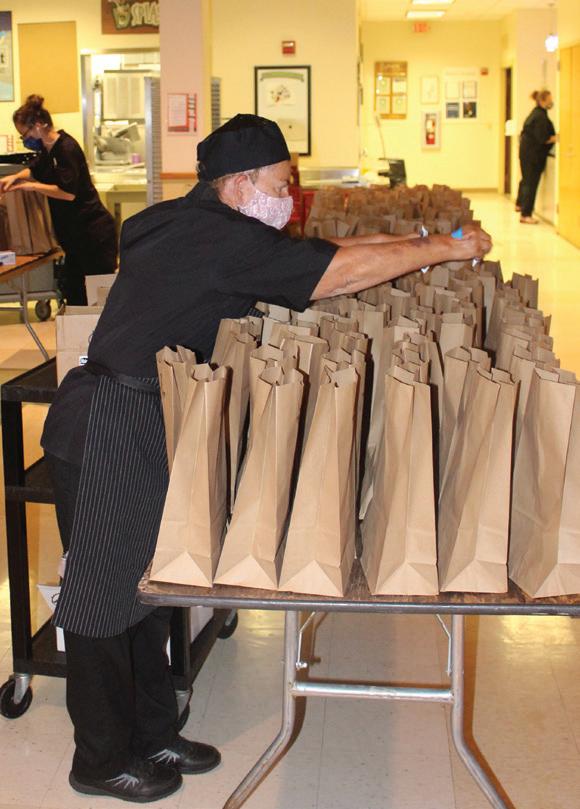
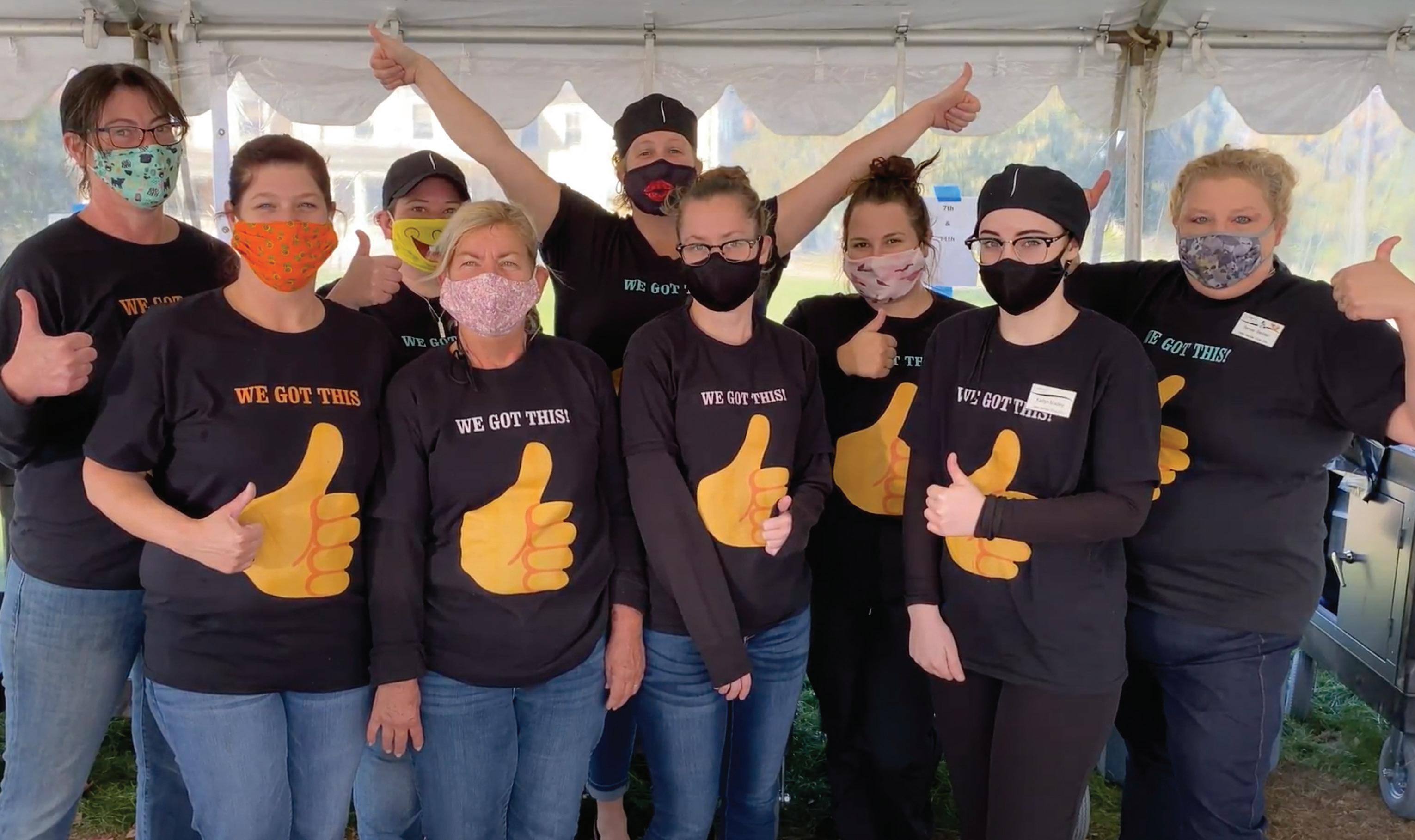
We’ve Got This!
SAGE DINING
Due to the emergence of the COVID-19 pandemic, SAGE Dining Services had to rethink the Berwick food service program. Among the changes is a new ordering feature for selecting meals, which the SAGE team packages and delivers in boxes to various campus locations.
The transition has not been without its challenges (the SAGE team misses seeing everyone at mealtime), but the team is learning what works and what doesn’t, showing incredible flexibility, and improving each week with guidance from community feedback and support.
Taking what has been learned during unexpected transitions, now is the time to re-envision the future of Berwick’s dining program, combining the best parts of what has been successful in the past with newly discovered efficiencies for the future.
Unique Middle School Measures
by Ryan Feeley, Assistant Head of School, Middle School Director

Take a moment to travel back in your memory to the days when you were 11, 12, 13 years old. What did you look forward to each day when you hopped out of bed? For most middle school kids, the answer usually centers around social interactions, athletics, games, art, or music in short, chances to connect with others and express yourself. Kids this age tend to crave those opportunities, which are so critical in their development. Now imagine being that age and being told: a.) you can’t spend time with your best friend because he or she is in a different pod, b.) sports will be intramural and will not involve competitions or even getting to decide which team you’d like to try out for, c.) singing is not allowed at school, and, d.) even recess, the one point in a middle schoolers day when they are afforded increased freedom to make choices around who they spend time with, what activity they engage in, and where they go on campus, will be highly structured and limited. That’s the scenario our students have faced this year. While we obviously prioritize safety and community health, these restrictions have put a damper on the experience at times.
So as the middle school, we’ve rallied to create more opportunities to have fun and keep spirits high. Going back to the fall, we had a wonderful October afternoon with our
Upper School Clubs
by Lucy Pollard, Upper School Dean of Community, Ninth Grade Dean, Upper School History Teacher


Pod Olympics that included a wide range of games and challenges including relays, soccer juggling, frisbee golf, jump rope, and more. This winter, we took our annual advisory lip sync challenge to another level, showing off our newly developed Zoom skills and producing some very entertaining student video performances to throwback hits by Rick Astley, the Spice Girls, Abba, and The Monkees. We’ve found new ways to stay connected as a community with virtual assemblies (including themes like bring your pet to assembly), virtual coffeehouses, and new and creative blue and white challenges, and we’ve got more in store as spring and warmer weather approaches. Like everyone else, our Middle School community is anxious to get back to something closer to normal. Still, until that day comes, we’re so grateful for the resilience of our students and faculty and for everyone’s efforts to keep morale high. We are working hard to ensure that Berwick’s Middle School maintains that fun-loving spirit and high energy it has come to be known for over the years.
Diversity Club making signs

Student-led Upper School clubs adapted and innovated to serve the Berwick community this fall. The Diversity Club continued its advocacy for antiCooking Club baking racist efforts on campus, hosting several discussions and installing an outdoor art exhibit across campus, featuring information on anti-Black racism in the United States. For more information and to see photos please refer to pages 10-11.
Like many clubs, Berwick Votes took advantage of the Hilltopper Tent in the fall, hosting several lunch discussions about the 2020 election. The Berwick Broadcasting Network also moved its operations outdoors, filming from multiple points on campus and sharing those episodes with the community via a series of emails. Unable to bake on campus, Berwick Baking Club leaders started a monthly email with suggested recipes for members to try at home. Overall, Upper School clubs’ perseverance has been another example of the resilience of the Berwick Academy community during the pandemic.

The Benefits of Climbing Trees for Children
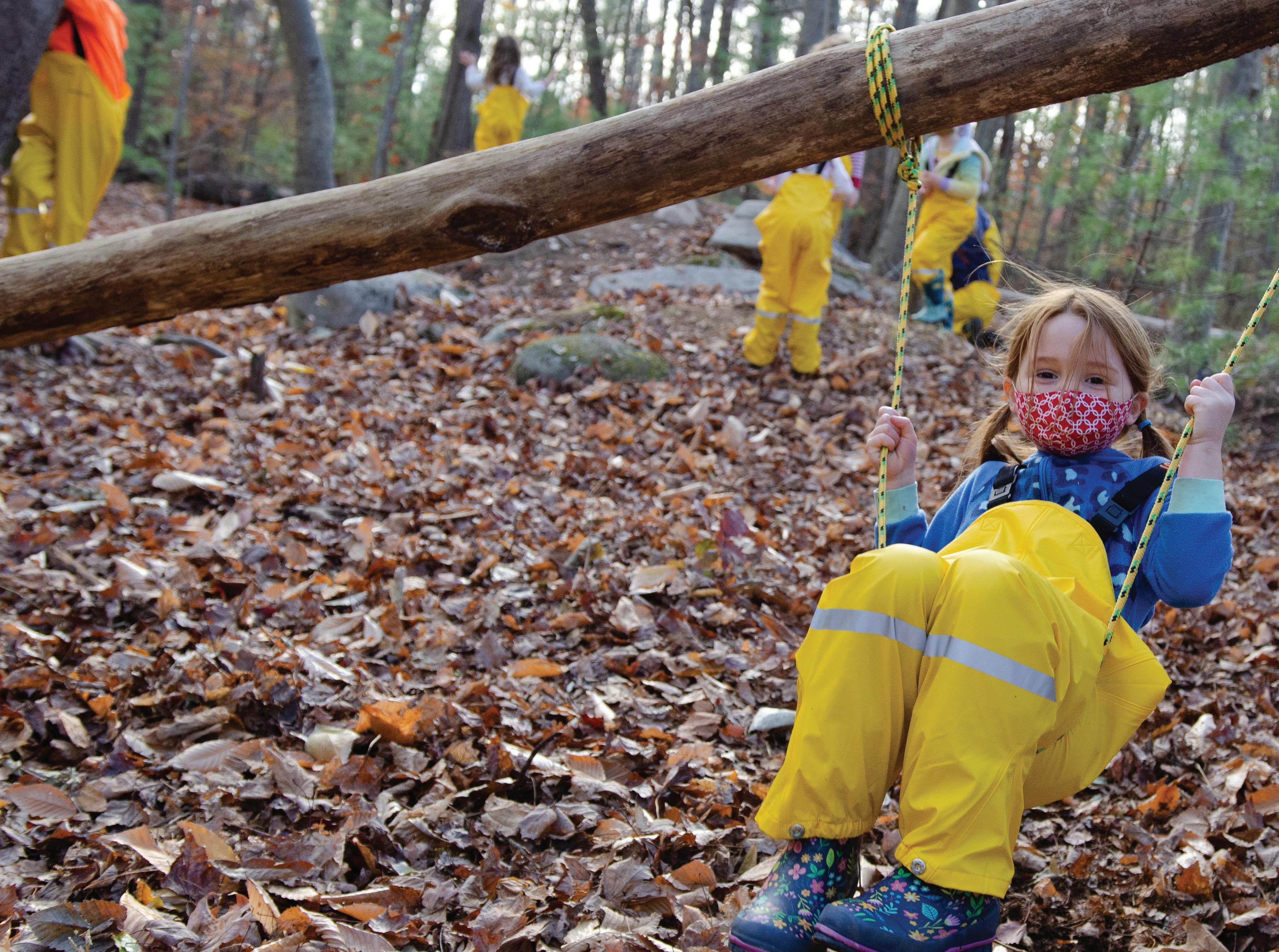
by Nancy Loftus, Pre-K Lead Teacher Also featured in Seacoast Moms
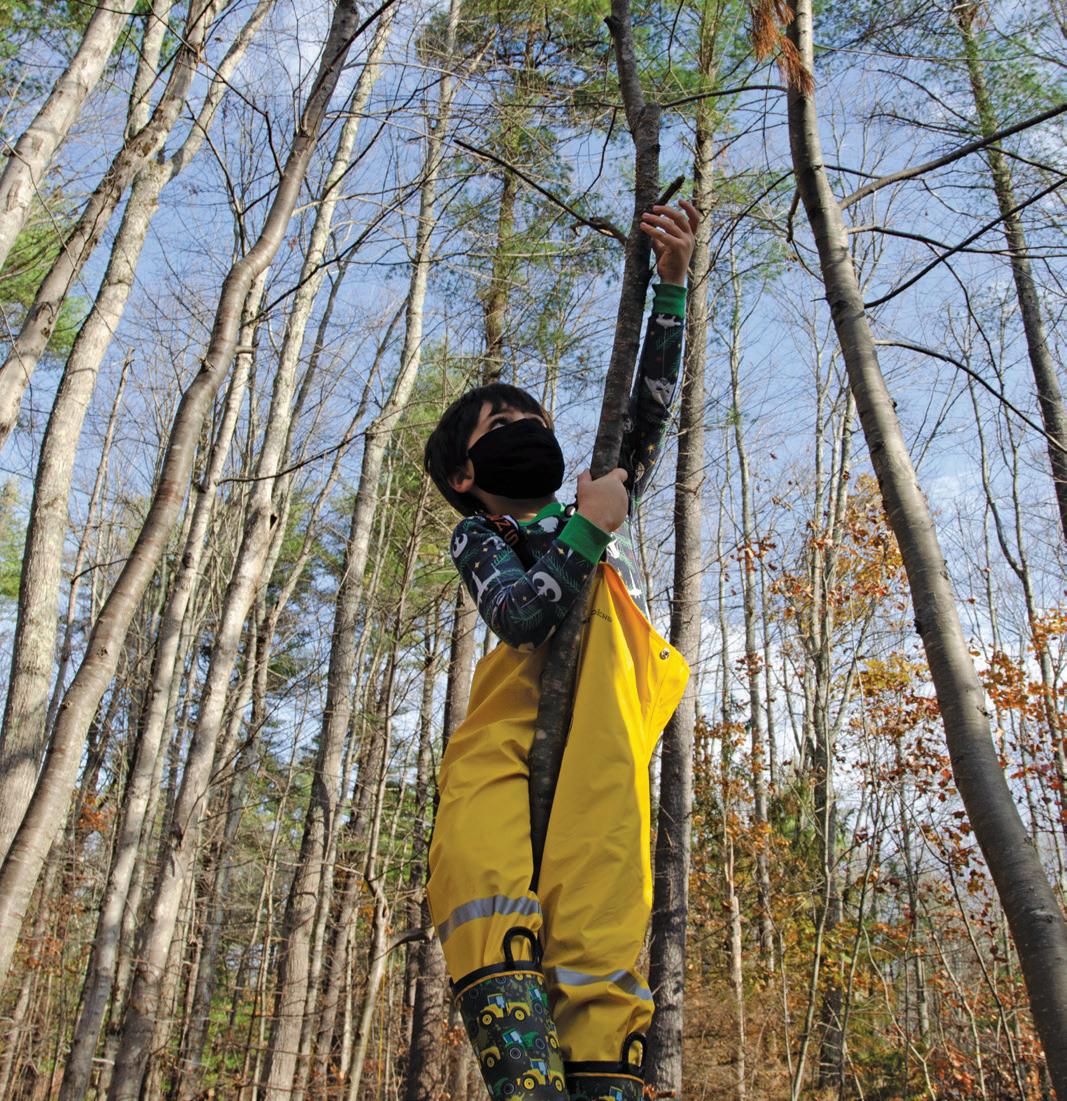
This fall, Pre-Kindergarten students (who range from ages three to five at Berwick Academy) engage in our outdoor classroom experiences. While outdoor play and learning are cornerstones of the Berwick experience, I also pulled from my summer academic work with Antioch University New England in Keene, New Hampshire. With this knowledge and information, this school year’s Pre-Kindergarten program of outdoor activities stretches children’s physical capabilities and selfconfidence. We do activities like rock scrambling, stick play, hiking, fort building, mud kitchen play, slackline crossing, and tree climbing. Our Pre-Kindergarten students, as well as our Kindergarten and First Grade students, enjoy regular outdoor classroom work. We introduce these adventurous activities, increasing the difficulty, and they gain confidence as time goes on.
Since the year includes ample play throughout an 80-acre campus and at our outdoor classroom, it was critical to reflect on those feelings. To remember that feeling of accomplishment and the thrill of doing something courageous: climbing trees, rock scrambling, sledding, riding your bike fast, digging deep holes in the dirt, playing with sticks, using real tools to hammer or saw, etc. We also know that research informed by parents and teachers of Forest Kindergarten programs indicates that children thrive on taking safe risks in play, especially while in nature. Children can explore many challenge levels at their own pace. Thus allowing a more holistic approach to child development.
SO, WHAT ARE SOME OF THE WAYS THAT OUTDOOR PLAY – AND CLIMBING TREES – ENHANCE CHILDREN’S SKILLS?
Tree swing in the outdoor classroom
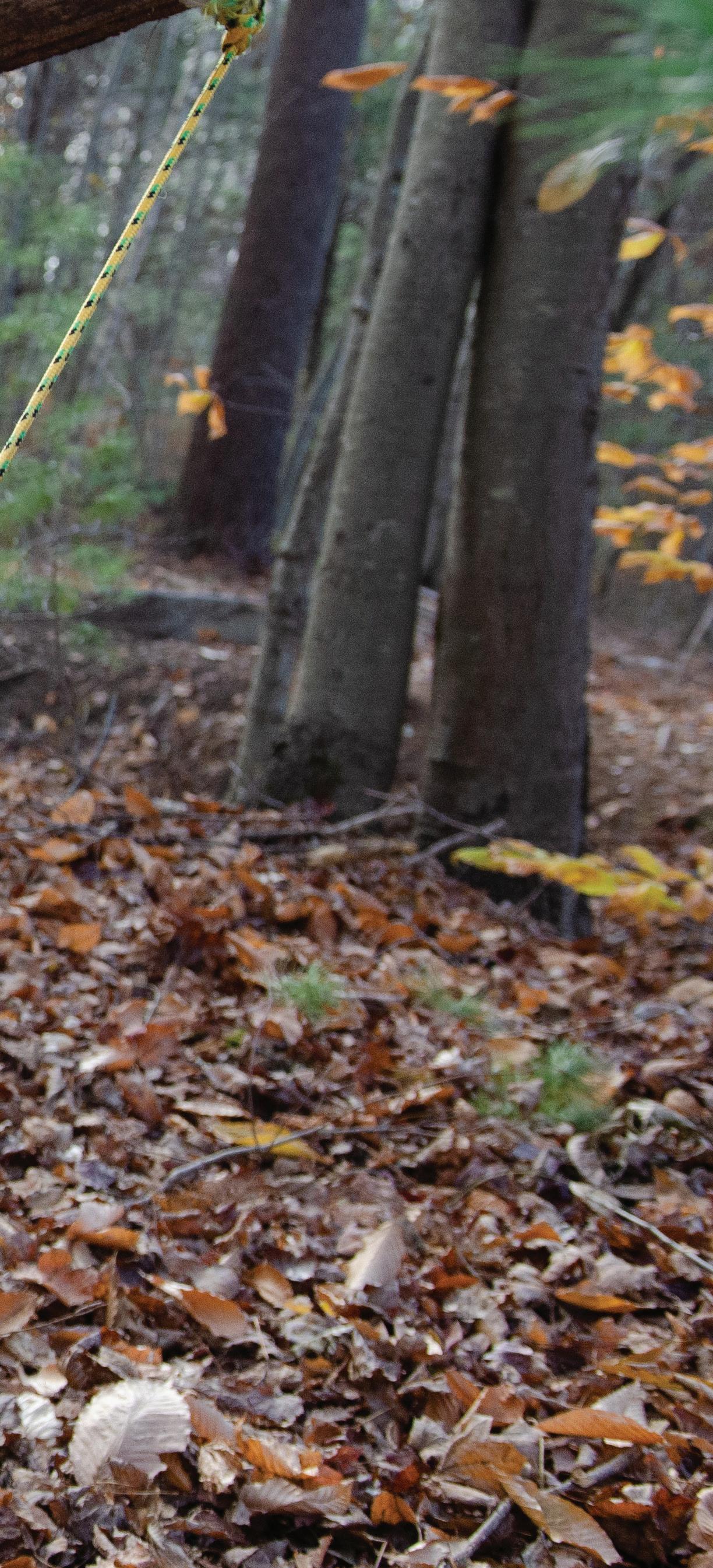
• Children use balance and core strength to stay upright. The unpredictability of the terrain of our extensive woodland trails asks something not required of them when walking down hallways or on sidewalks. • It gives various opportunities for sensory experiences. Teachers can use guiding questions such as: What do you notice? How does it feel? What do you hear? • Children collaborate and learn teamwork. Kids work with peers as they build forts using sticks and branches, move natural objects, or solve problems such as building a bridge over water. • Students learn to regulate how much force is needed to complete a task. From playing tag without hurting another child or holding something fragile with appropriate gentleness, children learn to regulate their force. Working outdoors, such as digging in the dirt, or pulling a wagon with heavy rocks or pails filled with stones or shells, activates this sense.
• Climbing trees requires motor planning, problem solving, patience, judgment, and
persistence. Whether it’s a child climbing to the top, or one who is happy to hang from a branch with their feet inches from the ground, the thrill is theirs for the taking. Adults can then inquire with children such things as: What is wonderful about trees? What do we need to be careful or mindful of as we play? How will we stay safe?
As an early elementary educator, I witness children enjoy as they explore the outdoors. I watch them gain confidence, communication skills, and an awareness of self.
I believe these are of equal value to what they gain cognitively through these grounded experiences. Even as we head into the colder winter months here along the Seacoast, we can continue to think about outdoor activities that nurture our children’s minds and bodies. From shoveling and digging snow, pulling and riding a sled, studying the changes in nature as seasons progress, and even winter hiking or snowshoeing – there are endless possibilities.
For more reading about the benefits of climbing trees for children, and outdoor play experiences in general, read Balanced and Barefoot: How Unrestricted Outdoor Play Makes for Strong, Confident, and Capable Children by Angela J. Hanscom.
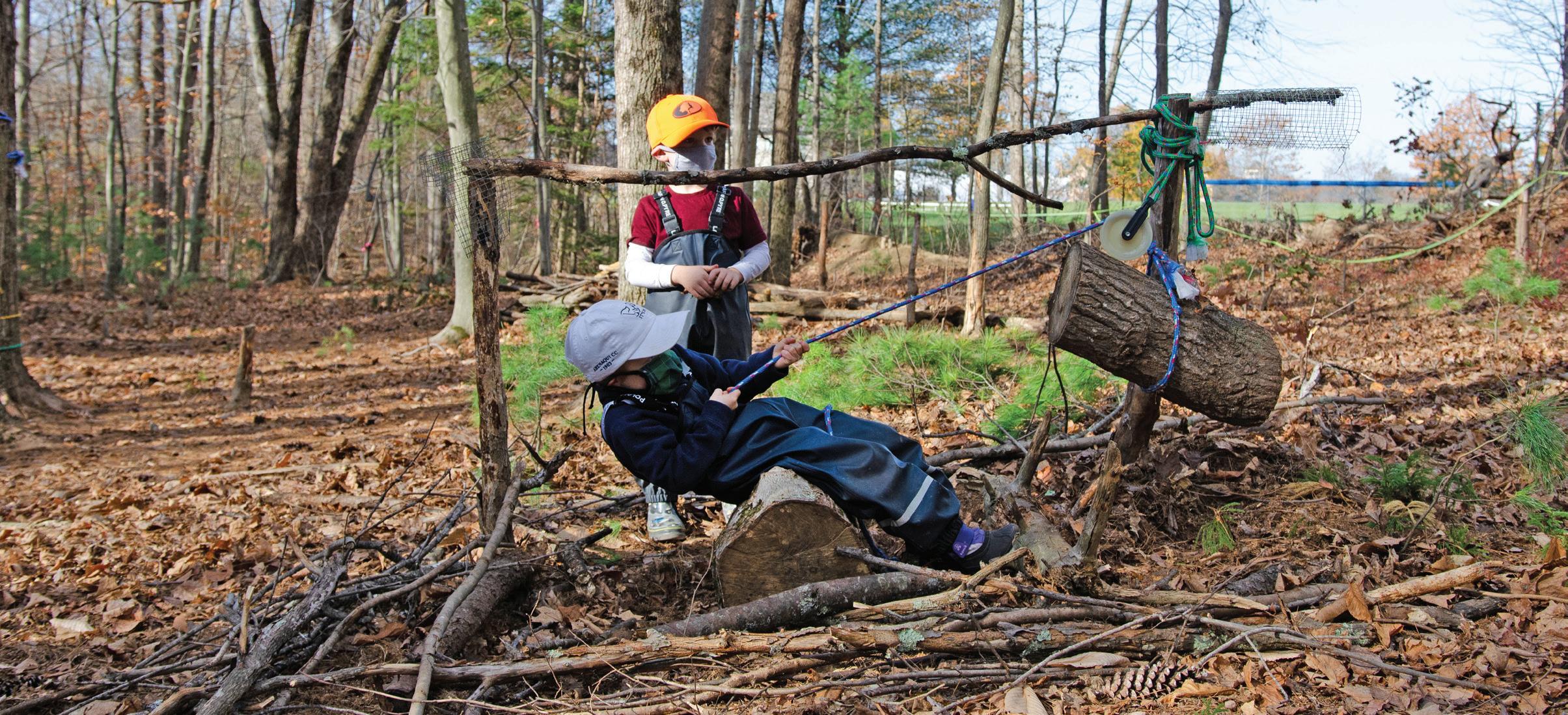
Berwick Spotlight Series
by Jana F. Brown
Director of Marketing and Communications, Inge Milde interviews Director of Wellness and Upper School Counselor, Kim Kryder while Assistant Director of Marketing and Communications, James Reynolds and Director of Information Systems, Seth Hurd (not shown) provide technology support
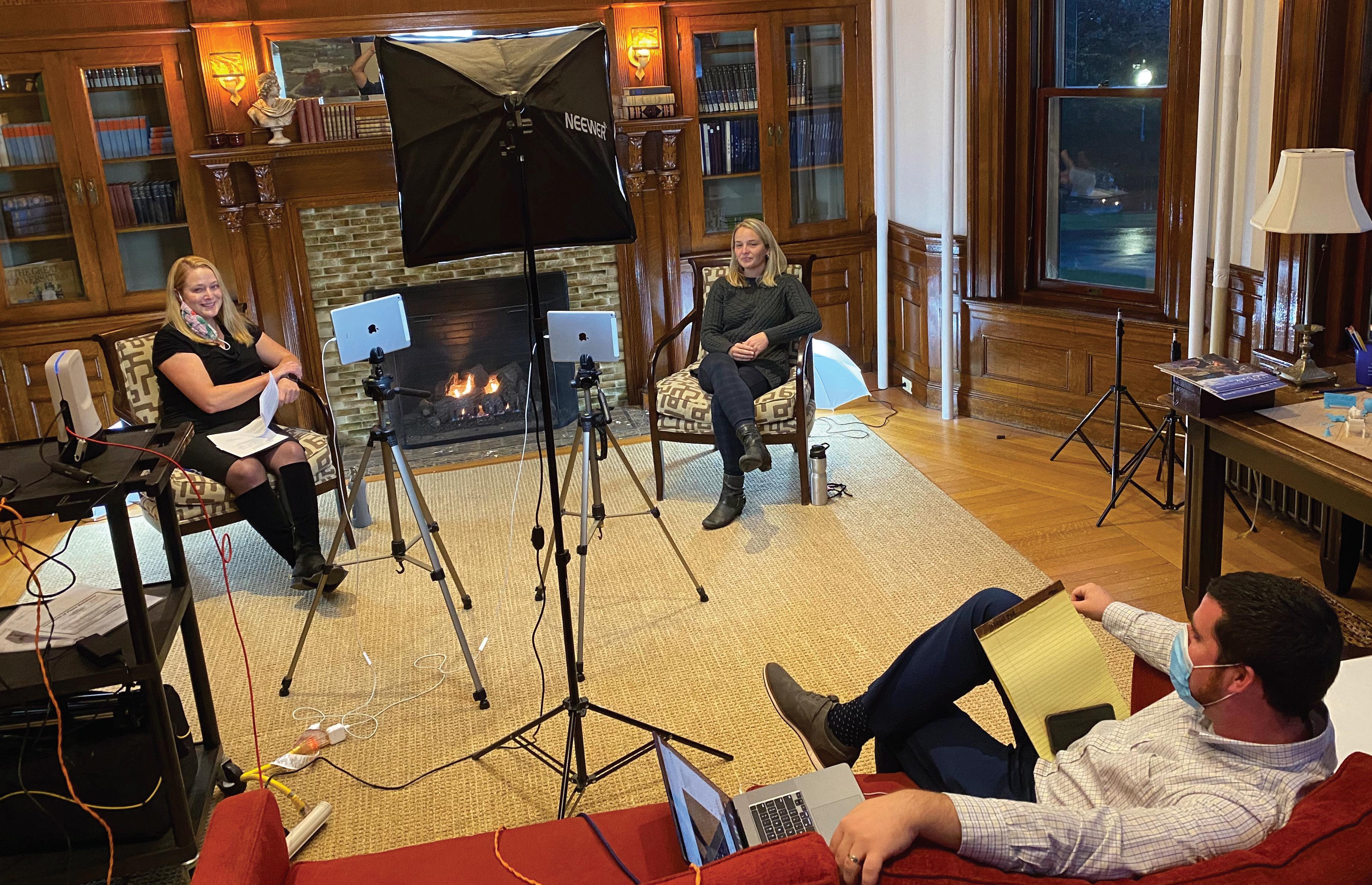
Najee Brown
NAJEE BROWN AND KIM KRYDER
With a goal of shining a light on educational topics of current significance to the Seacoast area and beyond, Berwick Academy launched the Spotlight Speaker Series in the fall. Each event is open to the public on YouTube Live, with questions submitted by attendees beforehand or in real time via the YouTube Live event dashboard. Speakers include Berwick Academy faculty and staff and their esteemed guests.
The first discussion, on October 28, featured Kim Kryder, Director of Wellness and Upper School counselor, talking about how to navigate family and wellness in the pandemic. Native New Yorker Najee Brown, who directs the “Sol” Series at the Seacoast Repertory Theatre, was the second to be highlighted in the series on November 30, addressing race and equity on the Seacoast.
Kryder spoke about ways parents can help themselves and their children cope with the upheaval of the pandemic, from reading comforting books , to having an open dialogue about how children are feeling, to giving them space to process their emotions in a challenging and uncertain time.
“The key now is to just be there for them, give that space for them to have those emotions but also to help them work through them and not just shut it down,” Kryder said. “Knowing your child and knowing that some of this is going to be very normal, given that we’re dealing with the pandemic and maybe they’re also going through puberty or friend drama and whatever else, we also need to be checking in to make sure there isn’t something more happening.”
Kryder also was asked about the metaphor for parents of “putting on their own oxygen mask first,” as adults are instructed to do in case of emergency on airplanes. She spoke of exercise and reaching out to friends to share our experiences, and prioritizing sleep as we do for our children.
“We have to take care of ourselves in order to then be able to be available for our kids,” she said.
Social media, Kryder added, can be both a lifeline and a curse – a lifeline during a time of isolation for everyone, but a curse when it comes to comparing life experiences
or feeling left out. She overcomes the negative of social media by selecting content (videos, etc.) that put a smile on her face or ease her stress. Kryder also addressed ways for parents to assess normal stress levels in their children versus warning signs of depression. She talked about ways for teens to reach out to make new friendships, despite the lack of in-person interaction.
“Maybe it’s a Saturday when we can’t all be together because of COVID and we can’t gather…but maybe we could still get together on Zoom and have a night where we’re all doing the same recipe together, or we’re all doing the same craft together, and have that be kind of that social interaction. It might feel weird in the beginning, but being able to connect through that screen is still something.”
The discussion with Najee Brown focused on the Black Lives Matter movement and its impact, in particular, on the Seacoast. In a conversation facilitated by Director of Cultural Competency Michael Buensuceso, Brown, an actor, playwright, and activist, spoke of his work with the Seacoast Repertory Theatre, whose “Sol” series presents Black, Indigenous, and people of color (BIPOC) narratives. The evening focused on how the arts can be used to expand conversations around equity.
“I don’t believe in entertainment; I believe in education. I feel like you should educate the mind, motivate the will, and stir the heart,” said Brown, who produces his own music and has authored a play called The Bus Stop, which was recently featured at the Seacoast Rep in Portsmouth. “I’ve also started something recently called New Season, where I’m bringing in local artists of color.”
Brown also has engaged in a series of conversations with local law enforcement in Eliot, Maine, and prosecutors in Rockingham County, N.H., through Eliot’s Green Acre Baha’i School. One particular encounter with a police officer, who said he did not understand the Black Lives Matter protests, was memorable for Brown.
“Once we started talking, you begin to see the scales fall off his eyes about racism,” said Brown. “And one of the things he said, and it touched me so deeply was, ‘I came in thinking that I knew. And I realized that just because I thought racism doesn’t exist because I had never experienced racism, doesn’t mean it doesn’t exist.’ He said something like, ‘Well, 9/11 was the only time this country ever came together.’ And I said, ‘Well, what about the Arab-Americans who were bullied and teased and beat up and harassed?’ And he was like, ‘I didn’t realize that.’
“It’s really about building these relationships,” continued Brown. “As a Black boy from Brooklyn, to sit there and have a conversation with law enforcement, it would’ve never happened. My father was incarcerated. The cops harassed my uncle. My family members have had cops busting their doors over and over again. I’ve seen it all. But now I’m here having conversations with law enforcement, watching the work slowly be done, and seeing the change of hearts. Who would have thought? And it’s working.”
Brown also spoke about his initial reluctance to remain in Maine after living most of his life in New York, where ethnic and racial diversity were more prevalent. He has come to love and appreciate the state’s proximity to the mountains and the ocean and the safe environment. Another part of his decision to stay on the Seacoast has been the opportunity to share new perspectives through the arts.
“I feel like I have a mission. I feel like I have a purpose,” Brown said. “And the fact that there are not many of me, I can do something that’s never been done before. That’s how it can become home. I can bring other artists up here who look more like me, and we can create things. I can apply a different mindset to people, or a different perspective.”
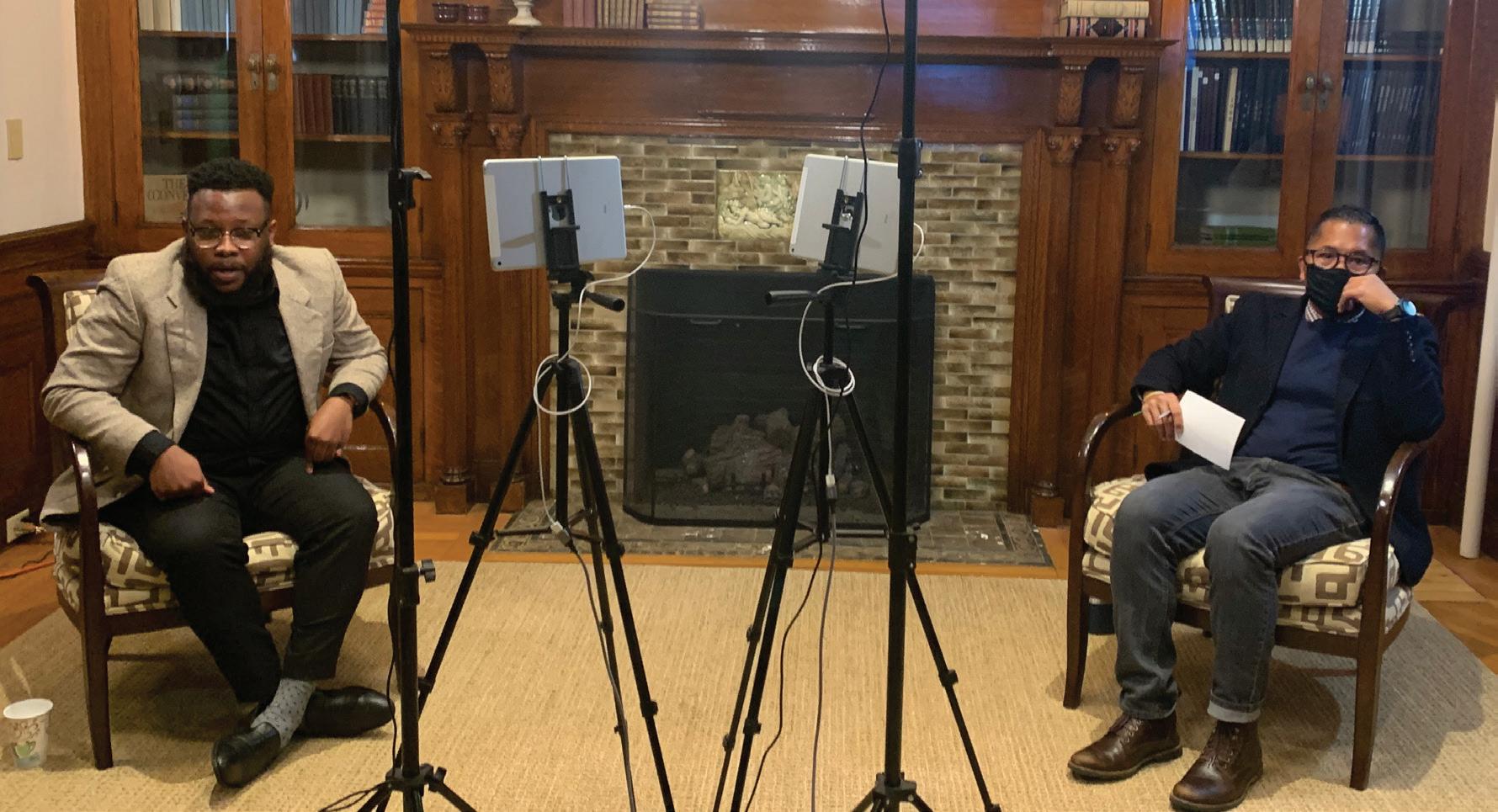
Najee Brown, Seacoast-based actor, playwright, and activist with Michael Buensuceso Director of Justice, Equity, Diversity, and Inclusion
TO WATCH THE RECORDINGS FROM THE SPOTLIGHT SPEAKERS SERIES, PLEASE VISIT HTTPS://BIT.LY/BERWICKACADEMY
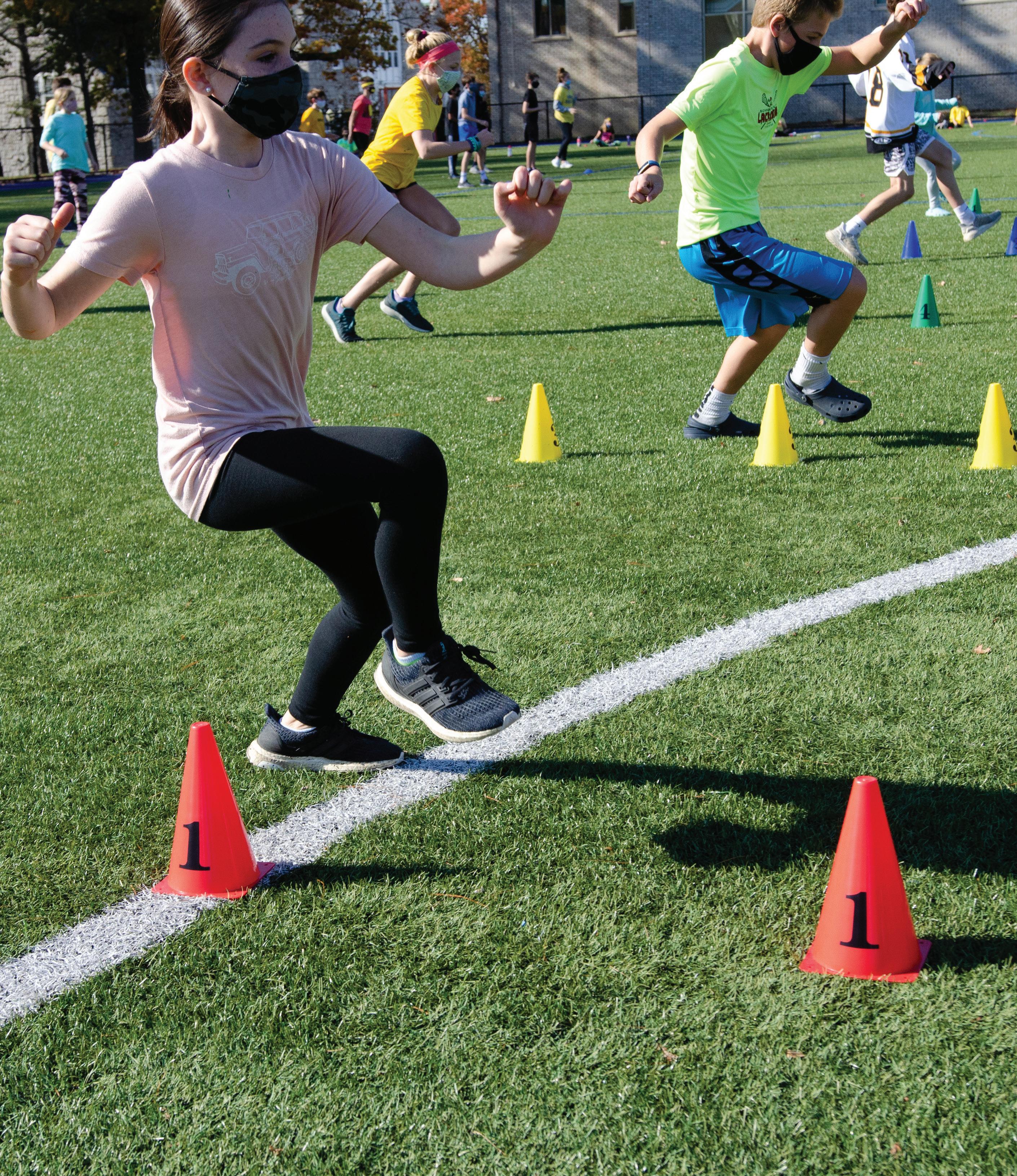
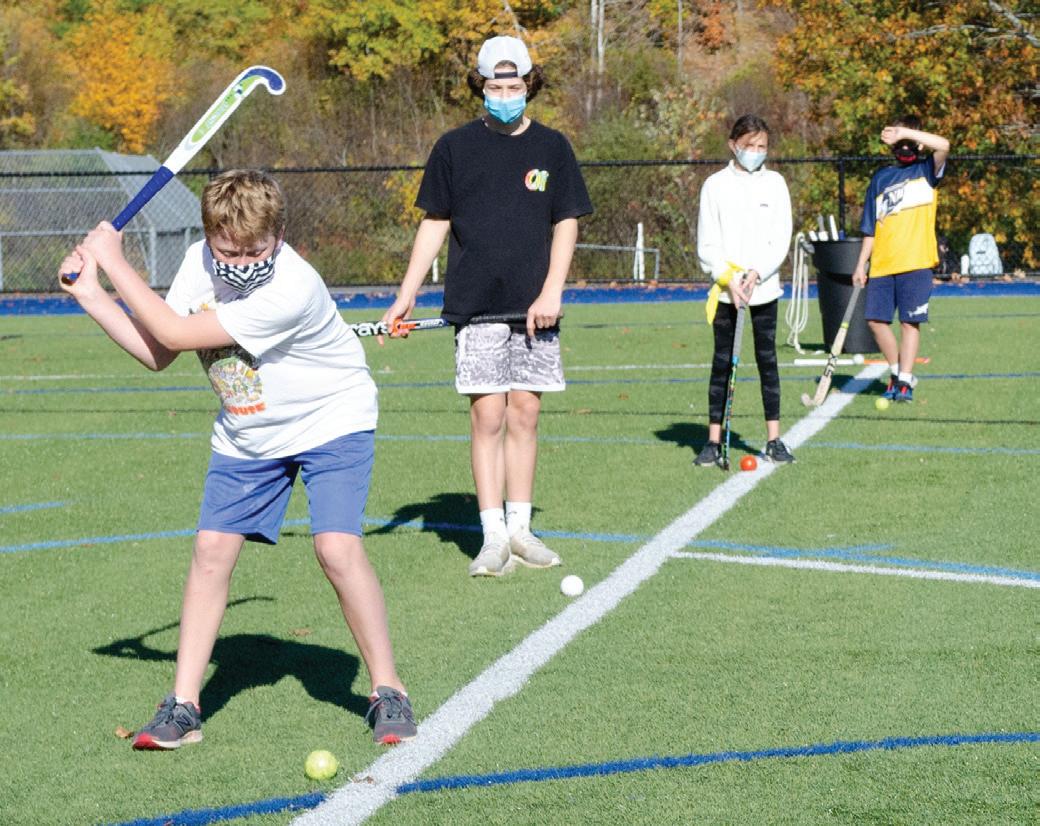
Let the Games Continue
POD OLYMPICS
by Travis Derr, Assistant Athletic Director, and Marilena Canuto, Director of Physical Education
Due to COVID-19, no interscholastic play has been allowed at the Middle School level, and in order to play sports on campus, students need to remain podded. Assistant Athletic Director Travis Derr knew the lack of competition was undoubtedly going to be disappointing. He reached out to Assistant Head of School Ryan Feeley, and together they brainstormed fun activities they’ve seen throughout their careers, and the POD Olympics was born.
The inaugural event was a POD Run, a one-mile trail run through campus. The start line was properly spaced and funneled gradually so students would be appropriately distanced. Other PODs were stationed all along the course when their grade was not running. Later in the fall, the competition continued with a series of events: relay races, disc golf, a crossbar challenge, hula hooping, and jump-roping. Each POD had a specific cheering location, and while they competed fiercely, events were designed around distancing so everyone could stay safe in these difficult times. Along with Derr and Feeley, Director of Physical Education, Marilena Canuto played a key role in planning and organizing the events. Overall, it was great to have the students competing and being active outside while safely having fun during this difficult time.
Field hockey
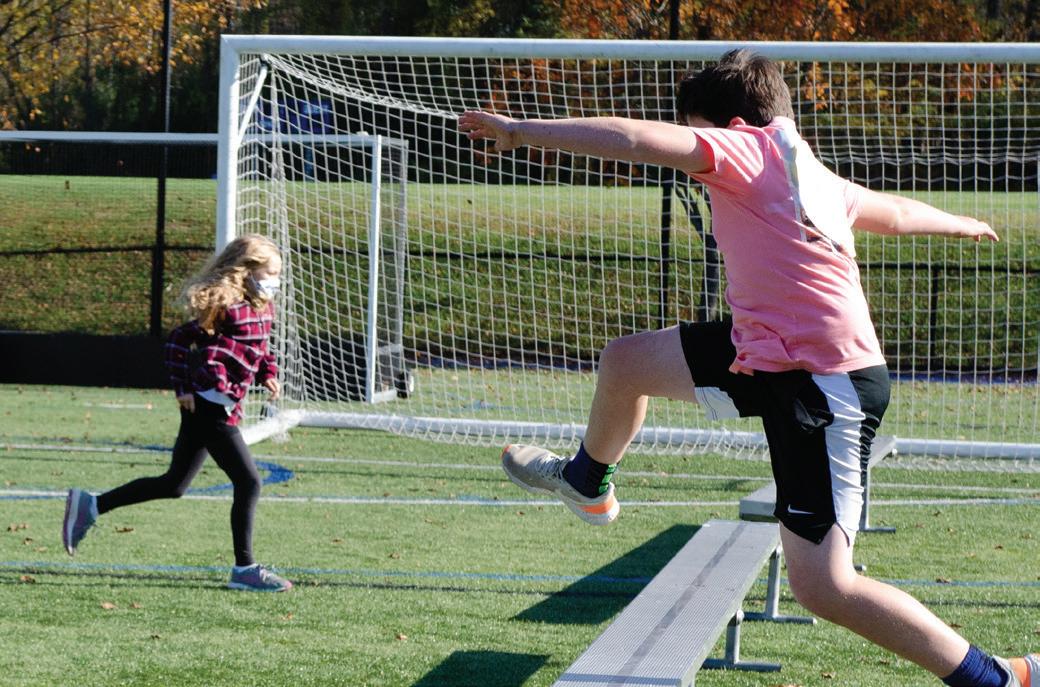
“Thank you for teaching us how to do these amazing treehouses. They were so fun to build and design. Thank you for providing
us with the materials to make them.” – Evie
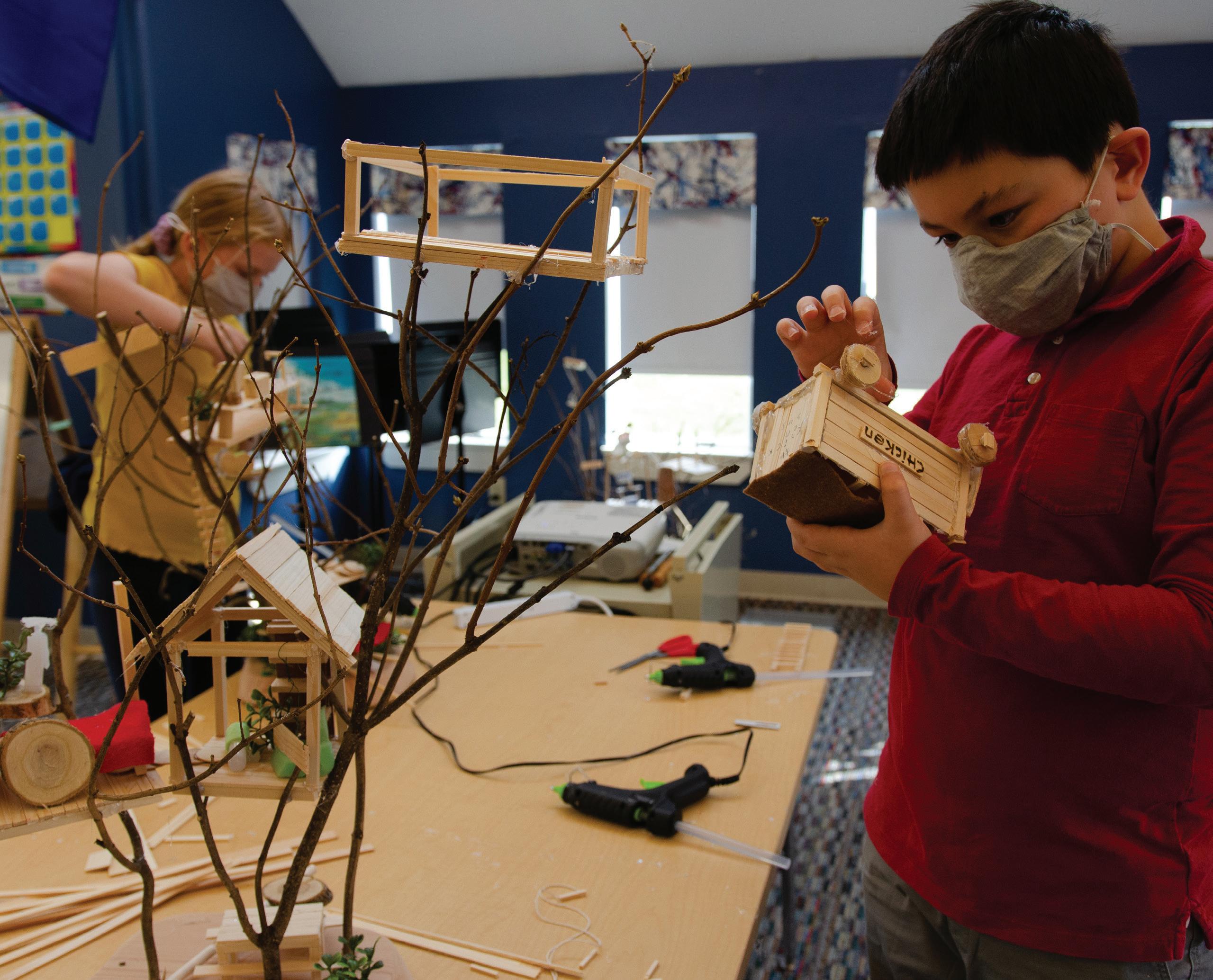
Grade Four Treehouse Project
by Mark Summers, Fourth Grade Teacher
Each year, fourth grade students have an opportunity to plan and create a miniature treehouse. We are supported by Al Lofgren, a middle school teacher from Oyster River, who has been creating treehouses with students for many years. Once a week, the children are able to spend time working on adding new features to their trees, such as platforms, ladders, swings, tables, chairs, and even hot tubs. Students are encouraged to use their imagination and limitless creativity, as this annual project serves as a cornerstone to the fourth grade experience in the Lower School.
Mr. Lofgren supplies Berwick with countless lilac branches, a wide variety of supplies from his workshop, and nicely finished bases. We help the children drill holes and glue in their branches – and off they go! Mr. Lofgren meets with us weekly to check on the children’s progress and give them creative ideas to explore. In addition to the children’s joy of building, they equally enjoy the opportunity to see their classmates’ treehouses evolve.
– Abby
– Ileana

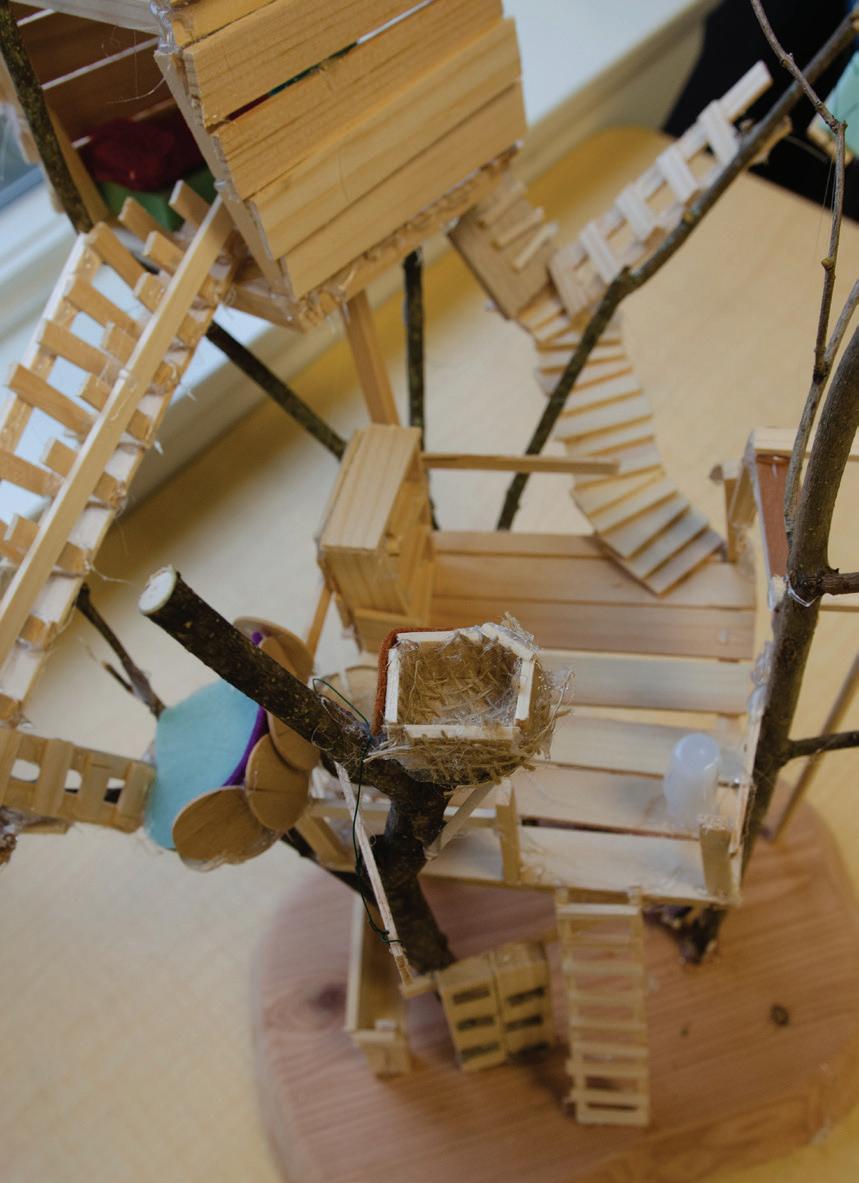
“My favorite part about my treehouse is the first platform. It is the biggest platform and has a shelf, bed, table, chair, and television. I have done a lot of projects in my life, but this one was my favorite. I will never forget all of the struggles and all the fixes I made. I love how it came out.”
– Kendall
– Tobin
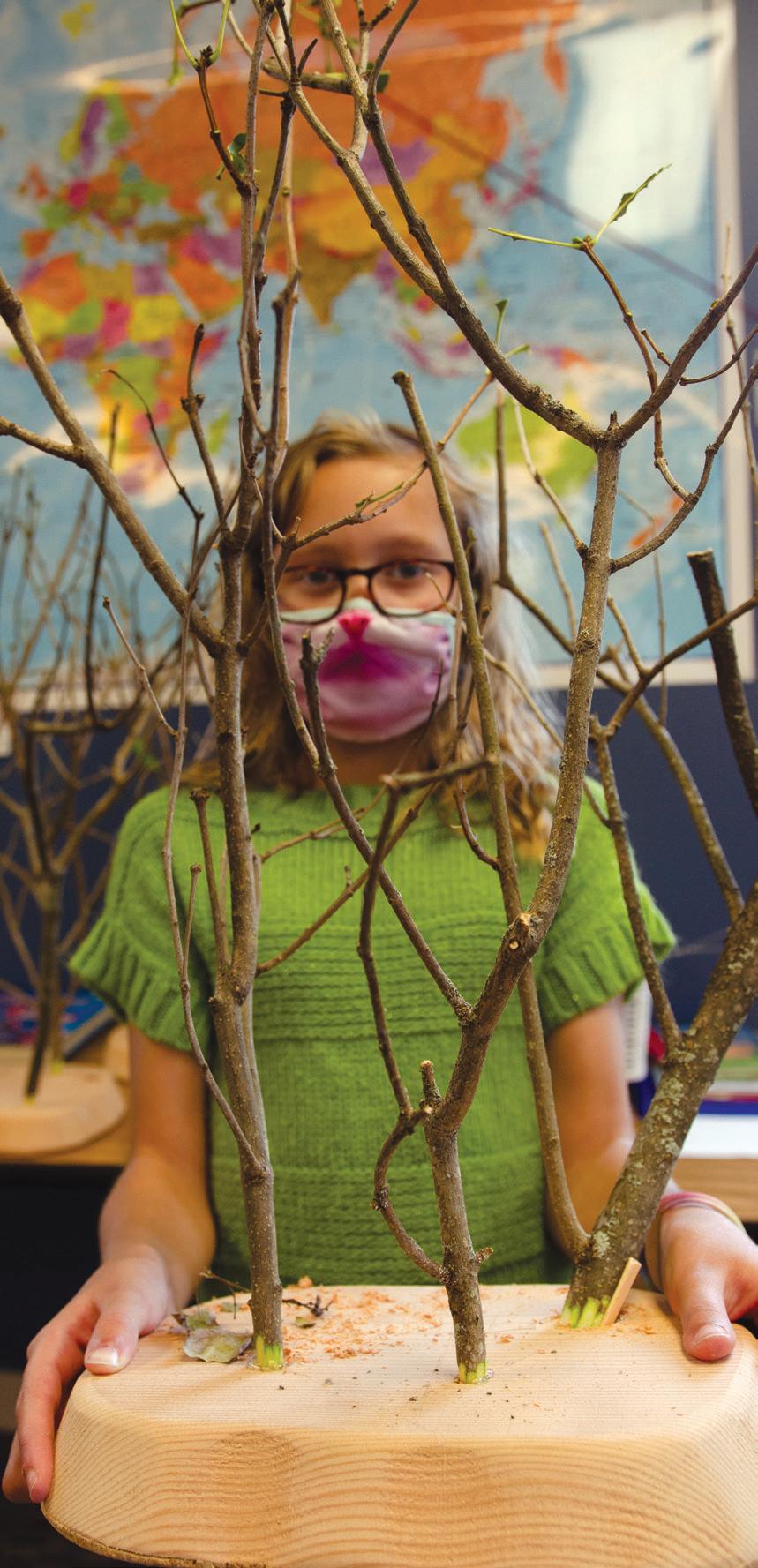
Ms. Canuto coaching soccer drills
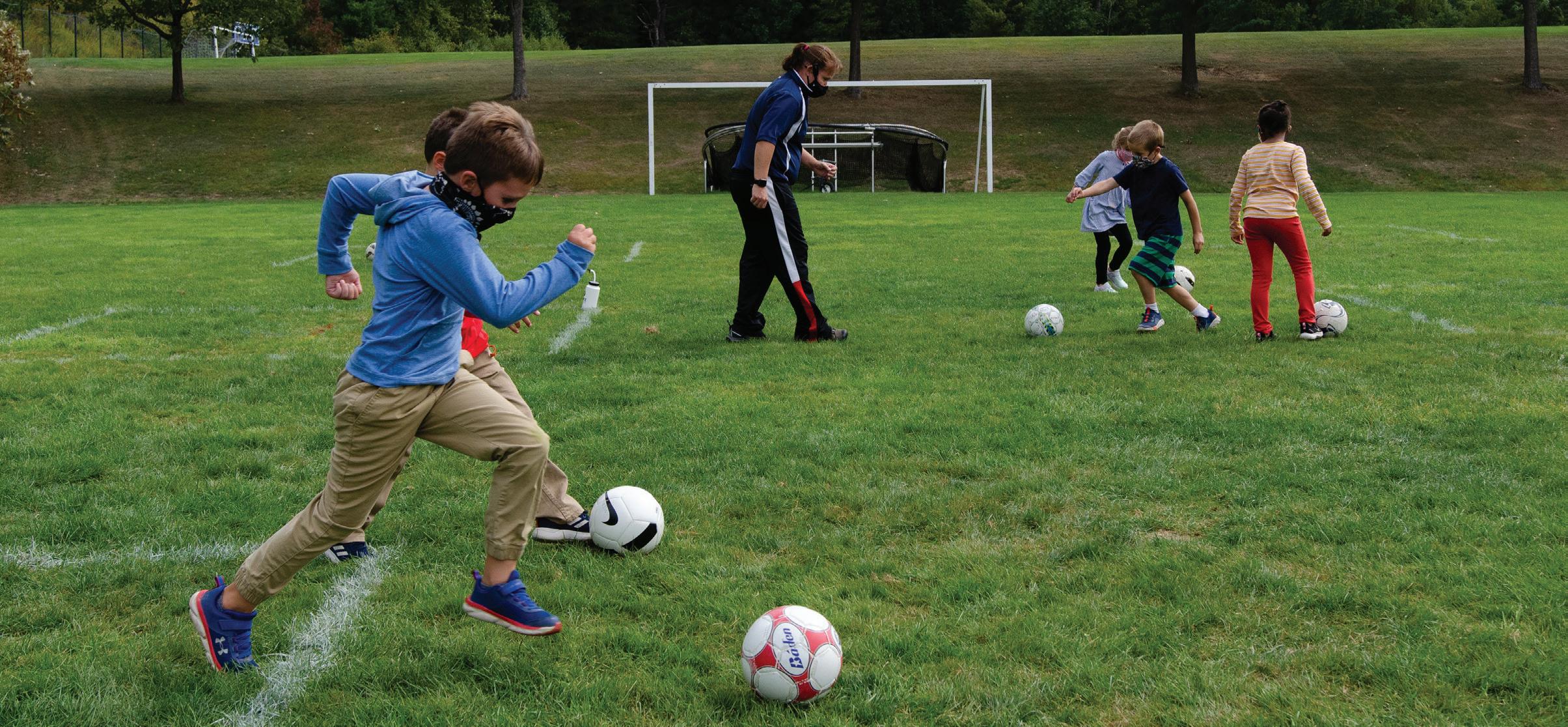
MARILENA CANUTO NAMED MAHPERD PHYSICAL EDUCATION TEACHER OF THE YEAR
Berwick Academy Director of Physical Education Marilena Canuto has been named Maine Association for Health, Physical Education, Recreation, and Dance (MAHPERD) 2020 Elementary Physical Education Teacher of the Year. Canuto was honored and accepted her award in a virtual award ceremony on Sunday, November 1.
Canuto has spent 23 years at Berwick Academy, beginning her career in 1997. She creates the physical education and wellness curriculum, coaches basketball, soccer, and intramurals, and has been a vital part of the Berwick community. Canuto helps organize spirit days and other activities that engage and enrich the learning experience of Lower School students and prepares them for more formalized team sport participation at the Middle and Upper School levels. Outside the classroom, Canuto also plans and supervises many of Berwick Academy’s sponsored community events, including an obstacle course for prospective students and the summer multi-sports camp.
“Marilena is an outstanding educator and truly deserving of this award. She is creative in her instruction and is always working to incorporate novel ideas into her curriculum,” says Head of School Jim Hamilton
“I greatly appreciate MAHPERD’s well-deserved recognition of Marilena’s professional endeavors,” adds Lower School Director Joel Hawes. “Whether within her highly regarded P.E. and Wellness programs or her stand-alone recreational events, I am constantly in awe of Marilena’s ability to inspire her students and support her colleagues in a variety of meaningful and fitness-oriented ventures.”
Berwick Academy congratulates Canuto on this prestigious statewide recognition and thanks her for all the passion and enthusiasm she brings to her Lower School physical education and wellness classes every day.
MAHPERD is a 501(c)3 non-profit organization based in Portland, Maine. Canuto is an active member of MAHPERD and has even been a guest lecturer at its annual conference, speaking about “Linking Literacy and Movement” in 2019. “I am honored to be the Maine Elementary Physical Education Teacher of the Year. Berwick has been an incredibly supportive community. Many wonderful faculty have collaborated with me on different creative ideas so that I could become a better professional. The administration has supported me in my professional development, which helped improve my teaching, so I share this award with my peers and Berwick’s leadership. It is a tremendous honor to teach at Berwick and receive this award. I appreciate all the support colleagues and staff have given me over the past 23 years.” – Marilena Canuto
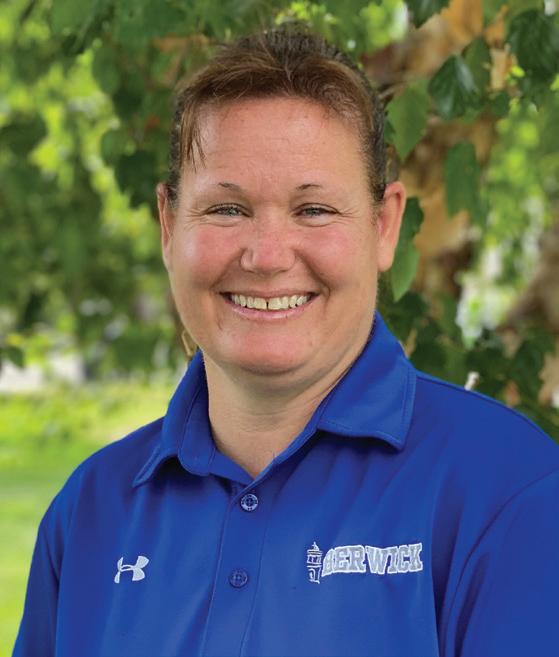
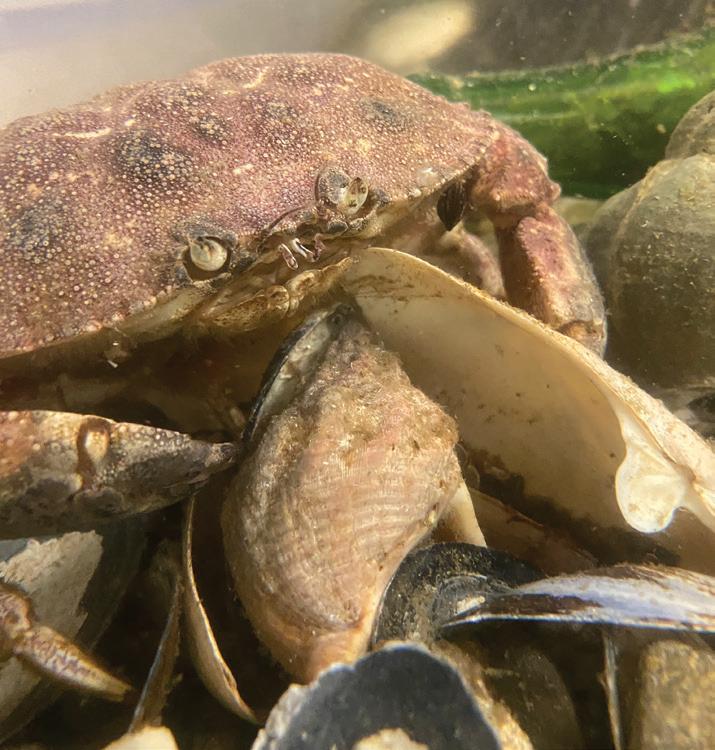
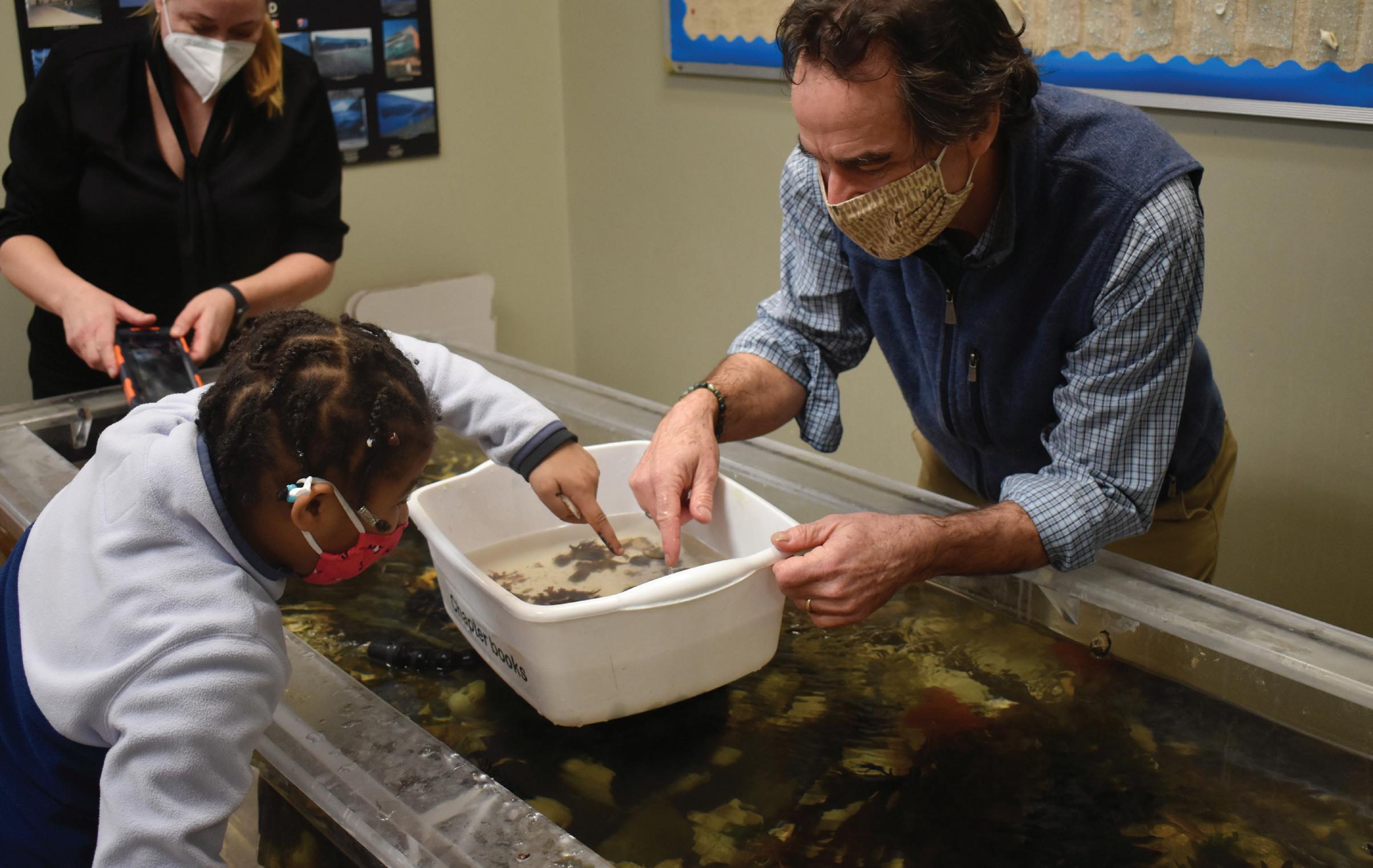
“I love reaching into the touch tank. The water is so cold and exciting. Yesterday, I touched the rock crab and next year I am going to pick it up!” – First grader
Touch Tank-Rock Crab
by Joel Hawes, Lower School Director
The study of science is a high-interest experience in the Lower School. Besides weekly science classes in our well-equipped classroom, outdoor education and crosscurricular subject experiences help bring science to life for Lower School students. A science classroom highlight is the 100-gallon saltwater touch tank, which supports students’ hands-on learning about North Atlantic tide pool ecosystems.
Purchased with support from the Berwick Parent Community in 2008, the touch tank typically contains starfish, sea anemones, barnacles, periwinkles, sea cucumbers, mussels, sea urchins, crabs, and various types of seaweed. The touch tank is self-contained, with built-in refrigeration and water circulation units. At the time of purchase, our goal was for the tank to be an integral part of science class studies, and it is rewarding to see how that objective has been realized over the past 12 years. While exploring within the touch tank, students monitor water salinity and temperature, help change the water at various intervals, and make specimen observations. Just as importantly, they heighten their curiosity and make essential connections with local Seacoast ecology.
One of the students’ favorite specimens is our Atlantic male rock crab, which has lived in the tank for the past four years. With its pink-brown coloring, the rock crab camouflages effectively on the tank floor, as it nestles into the sandy and rocky base. From detecting the crab to studying its behaviors (including eating store-purchased smelts), interactions with the rock crab and other specimens support our students’ investigations within the broader scope of elementary-level science engagement.
The male Atlantic rock crab didn’t have a name—until now!
Through a social media naming contest in early March Joel Hawes selected the winning name from over 20 submissions.
Our crustacean’s new name is ROCKY
Congratulations to Wyatt ’29 for naming our Atlantic rock crab!
Thank you to our runner-ups for your submissions:
Snapifer—Myles ‘28,
Cream Puff—Zach ‘33
Larry—Henry ‘28








